Western Michigan vs. Eastern Michigan Prediction & Best Bets (November 25, 2025)
The Western Michigan Broncos are one win from claiming a spot in the 2025 MAC title game. On Tuesday night, they will visit the rival Eastern Michigan Eagles as 7.5-point favorites to do just that.
Western Michigan has rebounded beautifully from a disastrous 0-3 start, as they have gone 7-1 over their last eight games. They have been especially dominant within the MAC, and a win against Eastern Michigan will give them a shot at this year’s conference championship.
Eastern Michigan is looking at a lost season, but will try to play the role of spoiler at home as +235 underdogs.
This looks like an easy game to call, but the spread could make it tricky. To help you find the best bet, I’ll break down the latest odds and key matchups before handing you my Western Michigan vs. Eastern Michigan prediction.
Game Basics & Context
- Matchup: Western Michigan Broncos (7-4) vs. Eastern Michigan Eagles (4-7)
- Date & Time: Tuesday, November 25th, with kickoff at 6:30 pm CT (7:30 pm ET)
- Venue: Rynearson Stadium in Ypsilanti, MI
- How to Watch: The game will be broadcast on ESPN
Team Record
- Western Michigan is 7-4, 6-1 in the MAC.
- Eastern Michigan is 4-7, 3-4 in the MAC.
Betting Odds
Check out the latest Western Michigan vs. Eastern Michigan odds, per DraftKings:
| Team | Spread | Moneyline | Total |
|---|---|---|---|
Western Michigan | -7.5 (-110) | -290 | Over 46.5 (-110) |
Eastern Michigan | +7.5 (-110) | +235 | Under 46.5 (-110) |
Rivalry & Venue Context
This is definitely a heated rivalry, as these inner-state enemies have battled each other 60 times throughout history. Western Michigan holds a commanding 36-22-2 series edge, while they have won the last two meetings as well.
Western Michigan took last year’s meeting by eight (26-18) and blew out Eastern Michigan the year prior (45-21). That followed a four-game winning streak by the Eagles.
As for the venue, Eastern Michigan will look to defend their turf. They failed to do that the last time they faced the Broncos on this field, but they’re 2-1 in the last three meetings here in this matchup.
On the year, however, Eastern Michigan has gone just 3-2 at home.
Why This Game Matters
This game doesn’t mean too much for Eastern Michigan, who have little to play for beyond pride. Taking out a bitter MAC rival would have its perks, of course.
Still, this game means much more for the visiting Broncos, who are in first place in the MAC. If they win here, they lock down the top spot and guarantee themselves a spot in the MAC championship game.
Team Profiles

Western Michigan Broncos
The Broncos struggled early in the year, getting smoked by Michigan State and Illinois, and losing a wild 33-30 tilt with North Texas. That 0-3 start feels like forever ago, however, as they used a four-game winning streak to take over the MAC.
A 26-17 loss to Miami (OH) was a blip on the radar, as they followed that loss up with three straight wins. They now are in full control of their own destiny, as they’re a win from a spot in the MAC championship game.
Western Michigan has ridden a strong rushing attack and a blistering defense to this point, but here’s a look at where they’ve specifically stood out this year:
- Running Away: Western Michigan loves to run, as they own the nation’s 9th highest rush rate. They aren’t super explosive, but they do put up 177.8 yards per game on the ground. If they can establish the run, it’s game over.
- Protect the Ball: The Broncos don’t pass the ball that much, but when they do they take care of the football (17th lowest interception rate). They also rank 40th in giveaways on the year, making them a team that emphasizes taking care of the football.
- Elite Pressure: Western Michigan does a lot well defensively, but it starts up front with a staggering pass rush (9.52% sack rate) that ranks 5th in the country. That’s allowed them to stifle teams through the air, as they rank 4th against the pass.

Eastern Michigan Eagles
It’s been a rough campaign for the Eagles, who also got off to a sluggish 0-3 start, but never recovered. They snapped that skid with a nice 34-31 win over Louisiana, however, and they’ve been in better form with a 3-2 run over their last five games.
To their credit, Eastern Michigan has been putting points on the board. They’ve had just two games all year where they failed to score at least 20 points, and they’ve been elite at executing their offense when in scoring position.
Their overall record looks bad, but here’s a quick look at some areas they’ve excelled in this season:
- Strong Finish: Despite only ranking 81st in points scored per game, you’re looking at the best red-zone offense in the country. As impossible as it may seem, the Eagles rank 1st in red-zone scoring with an unheard of 100% scoring rate. The Oklahoma Sooners are the only other college offense with a perfect conversion rate.
- Max Protect: Eastern Michigan runs a balanced system that passes 50.15% of the time, and they protect their quarterback as well as anyone. They enter Tuesday’s game with a 2.91% sack rate on offense, which is the 6th best in the college ranks.
- Air Denial: The Eagles are not strong defensively, as they get run on at will and give up almost 30 points per game. However, teams can’t throw the ball on them. They only give up 185.2 passing yards per game, which is the 21st lowest in NCAAF.
Key Matchup Angles
Consider the following key Western Michigan vs. Eastern Michigan matchups:
- Western Michigan’s rush offense vs. Eastern Michigan’s run defense: This is the key to the game. The Broncos want to run on the opposition, and Eastern Michigan’s leaky run defense (133rd) is bound to oblige.
- Eastern Michigan’s o-line vs. Western Michigan’s pass rush: This is also pretty crucial, as something has to break. The Eagles have been elite at protecting the passer, but the Broncos are just as good at taking QBs down.
- Eastern Michigan’s red-zone offense vs. Western Michigan’s red-zone defense: I’m not entirely sold that the Eagles will get inside the red zone enough to test this matchup, but they’re perfect so far. If they can get inside the 20 and punch in touchdowns, perhaps they can keep this one interesting.
Betting Insights & Trends
Western Michigan has been elite (8-3) against the spread in 2025. They have responded well when favored (5-1) and are also decent on the road (3-2) and inside the conference (5-2).
The same can surprisingly be said for Eastern Michigan, who have gone 7-4 against the spread overall. Their defense has failed them often in terms of getting wins, but they are 5-2 ATS inside the MAC. They’re also 3-0 against the spread as a home dog.
Best Bets & Confidence Levels
Check out my top Western Michigan vs. Eastern Michigan picks:
| Bet | Recommendation | Confidence Level |
|---|---|---|
Western Michigan ATS -7.5 (-110) | The Broncos have a ton riding on this game, and they win two key matchups pretty easily. I don’t think this one ends up being particularly close. | 7/10 |
Over 46.5 (-110) | Eastern Michigan gives up almost 30 points per game. Western Michigan could legit get most of the points on their own. I think the Eagles do enough to make sure they don’t have to. | 7/10 |
Prop Play – Broc Lowry Anytime TD (-275) | It’s this or the Broncos to win. Both are pushing -300 odds, but they feel like locks. Lowry has 12 rushing scores, and the matchup is sublime. | 7/10 |
- Primary Pick: Western Michigan ATS -7.5 (-110)
- Secondary Pick: Over 46.5 (-110)
You can fear Eastern Michigan’s ATS data if you’d like, but I’m trusting in narrative street. Western Michigan stands to lose a lot here; potentially sliding out of the MAC title game altogether.
Western Michigan will show up and pound the rock. That should lead to plenty of scoring and a Lowry rushing touchdown. I think Eastern Michigan can put up enough of a fight early to contribute to a pretty palatable over/under wager.
Western Michigan vs. Eastern Michigan odds can shift fast — track every line move, compare spreads and totals, and secure the best value before kickoff at the top football betting sites.
Risk Factors & What Could Go Wrong
Things don’t always go as planned in sports betting. Here’s why my Western Michigan vs. Eastern Michigan bets could miss the mark:
- Home Field Edge: Eastern Michigan is at home, and they’ve had success lately in this matchup on their home field. That could be enough of an edge against a bitter rival.
- Spread the Wealth: Lowry feels like a lock to deliver, but it’s always possible Eastern Michigan keys in on him. Perhaps it’s Jalen Buckley’s day to shine, instead.
- Stingy Defense: Western Michigan’s 15th-ranked scoring defense plays into why they’re a great bet to cover this spread. It could also work against us nailing the Over bet.
Putting Our Pick on the Board: Here’s How It Plays Out
Final Score Prediction: Western Michigan 37, Eastern Michigan 20
The safest Western Michigan vs. Eastern Michigan prediction is simply for the Broncos to win. You’re not going to fall in love with their -290 moneyline, though, so looking for some other bets makes sense.
I think they have the edge on the ground and overall on defense. That should combine to give them a terrific chance to win by 8+, even on the road. Dual-threat quarterback Broc Lowry is also a huge part of what they do on the ground, so him punching in his 13th rushing score of the year seems logical.
The Over is very much in play here. Western MI’s defense could complicate things, but they dropped 35 points last week and have such a good matchup on paper in this game.
Carolina Panthers vs. San Francisco 49ers Prediction (November 24, 2025)
The Carolina Panthers and San Francisco 49ers offer an unexpectedly meaningful week 12 Monday Night Football showdown, where the Niners will be touchdown favorites.
Carolina has done well to rebound following a slow start, with the Panthers quietly winning five of their last seven games. San Francisco has battled injuries to stay competitive all year, and will hope to add to a solid 7-4 mark.
The 7-point spread indicates the Niners are the easy pick, but betting on the NFL is rarely so simple. That said, the game does have a robust 49.5 total, while the 49ers are getting healthy at the right time.
Are the 49ers a smash bet, or is there sneaky value with Carolina? I’ll inspect the latest odds and key matchups, working my way to this game’s best bets and my Panthers vs. 49ers prediction.
Game Info Snapshot
- Date & Location: Monday, November 24th, 2025 | Kickoff at 7:15 pm ET (ABC/ESPN) at Levi’s Stadium in Santa Clara, CA
- Team records entering the game:
- Panthers: 6-5
- 49ers: 7-4
- Odds (from ESPN Bet)
- Spread: Panthers +7 (EVEN) | 49ers -7 (-120)
- Moneyline: Panthers (+320) | 49ers (-425)
- Total: Over 49.5 (-110) | Under 49.5 (-110)
The Panthers vs. 49ers odds indicate San Francisco is the far better team. They only have one more win, but they are at home and are a lot healthier than they were even a couple of weeks ago.
The game total is fairly hefty, which is a credit to the 49ers offense, but also to both defenses not playing at an elite level on the year.
Storylines to Watch
The biggest Panthers vs. 49ers storyline has to be the fact that Carolina is 6-5 and has a shot at making the playoffs. The Panthers have big upsets over Dallas and Green Bay on the year, while they managed to sweep the Falcons.
Carolina could lose this game and still be in position to make a playoff run. Either way, they have enjoyed a better-than-expected 2025 campaign and should feel good about where they are now compared to a year ago.
There’s more to keep in mind for this game, so check out the following Panthers vs. 49ers storylines:
- Turning a Corner?: Bryce Young went off last week (448 passing yards, 3 TDs). Is this a sign of things to come? If so, he could put on a show under the bright lights of MNF.
- C-Mac Revenge: Christian McCaffrey is probably thankful the Panthers traded him to the 49ers, but there’s likely something about this matchup that will give him some added motivation to perform well.
- Full Strength: San Francisco is still down key bodies on defense, but the offense is rounding into form. George Kittle, Ricky Pearsall, and Brock Purdy have missed a lot of action this year, but all three will be available against Carolina.
Team Profiles

Carolina Panthers
The Panthers did not look like a playoff contender to start the year, as they got housed 26-10 by the Jaguars in week one and then got tripped up by Arizona in week two.
Carolina came to life after that, as they’re a rock-solid 6-3 ever since. They haven’t been the most consistent bunch, but they have exhibited a competent offense and a defense that has flashed the ability to dominate.
Following a win over Atlanta last week, they are presently in position to make a play for first place in the NFC South.
Here’s a look at where they’ve stood out the most so far:
- Pound the Rock: The Panthers are a run-first team, and they’re good at it. They enter this MNF matchup ranked 12th in rush rate and generate 127.1 rushing yards per game (9th in the NFL).
- Smart Play: Carolina is a fairly young team that is learning on the fly how to win games, but one thing they don’t do is commit a lot of mental errors. The Panthers come into this game ranked 2nd in penalties per game and 3rd in penalty yards per game.
- Bend, Don’t Break: Carolina’s defense isn’t consistently dominant at much, but they tend to stifle teams inside the 20. They let you drive the ball regularly, but they’re only allowed a score 52% of the time inside the RZ (9th best).

San Francisco 49ers
The 49ers have to feel pretty good about their 7-4 start when you consider the injuries that have struck their roster. Quarterback Brock Purdy has only suited up for three games, while key contributors like George Kittle and Ricky Pearsall have missed a lot of action.
San Francisco is getting healthy on offense, though, and that could help mitigate some issues they have dealt with on the defensive side of the ball.
Overall, this is still a well-coached and talented group that is at least average in most regards on both sides of the ball.
Here’s a quick look at what they’ve excelled at in 2025:
- Finish the Job: This has not been a very cohesive offense, but they’ve still done a good job moving the ball and finishing drives. On the year, they convert 62% of the time inside the 20, which is good for 11th in the NFL.
- Pass Happy: San Francisco’s ground game has not been very good, which has them passing out of necessity. They own the league’s 13th-highest pass rate, but they’ve also simply been very good in that department, ranking 7th in completion rate, 8th in yards per pass, and 2nd in passing yards per game.
- Stiff Front: San Francisco hasn’t run the ball very well, but they’ve at least been stingy on the ground defensively. They come into this matchup ranked 12th against the run and are allowing just 4.1 yards per carry (13th).
Key Matchups & Angles
Check out the key Panthers vs. 49ers vs. matchups:
- Panthers rush offense vs. 49ers run defense: This is easily the key to this game. Carolina typically needs to run well to stay in games, so it’ll be their strong rush offense against a solid defensive line for the Niners.
- Christian McCaffrey vs. Carolina’s defense: The 49ers will also want to try to get their best offensive weapon going. It’s a solid spot to try, as Carolina is just 17th against the run. Just as importantly, McCaffrey is extremely active as a receiver out of the backfield, and the Panthers allow the 4th most catches (54) to RBs.
- George Kittle vs. Carolina’s defense: Kittle hasn’t played much this year, and the 49ers could opt to have him block a lot, but he also could smash here. On the season, the Panthers have been torched by tight ends to the tune of 718 yards (4th most).
Betting Trends & Odds Context
Take a look at the latest 49ers vs. Panthers odds (from ESPN Bet):
| Team | Spread | Moneyline | Total |
|---|---|---|---|
Panthers | +7 (EVEN) | +320 | Over 49.5 (-110) |
49ers | -7 (-120) | -425 | Under 49.5 (-110) |
Take a look at some key betting trends for this showdown:
- Public Betting: The public doesn’t like Carolina’s chances here, as 96% of the bets favor San Francisco, and they’re getting 96% of the money, too.
- Record History: These teams have only played each other 23 times, with Carolina surprisingly holding a narrow 13-10 edge. It’s been all 49ers lately, though, as they won the last two meetings and three of the last five.
- ATS Tidbits: Carolina has been good (7-4) against the spread overall, while they are 4-2 ATS as the road team and 6-3 ATS as the underdog. The 49ers are 6-5 against the spread as a whole, and they are 4-2 ATS when favored.
Best Bets for Panthers vs. 49ers
Pick 1: Panthers ATS +7 (EVEN) – 7/10 Confidence
Why We Like It
Carolina isn’t an elite team, but neither are the 49ers at the moment. If they can pound the rock and avoid mental mistakes – two things they’ve proven they can accomplish – they can hang tight and make the Niners sweat this one out.
Risks/What to Watch
The 49ers are getting healthy, they’re at home, and they’re probably the better team overall. If they come out firing on all cylinders, they absolutely could tee off and dominate Carolina.
Pick 2: Under 49.5 (-110) – 7/10 Confidence
Why We Like It
There is plenty of offensive upside in this game, but the Panthers could dictate the pace on the ground. If they can do that, this will be a slower and low-scoring affair.
Risks/What to Watch
San Francisco has the leg up in several of these matchups. If they take advantage of them and put points on the board early, we could be looking at a shootout.
Pick 3: Prop Play – George Kittle Over 50+ Receiving Yards (-152) – 7/10 Confidence
Why We Like It
Carolina does not stay in front of tight ends very well. On MNF, they have to track one of the best in the business. Kittle hasn’t been around much this year, but he’s the type of guy who feasts in favorable spots. A Kittle Anytime TD also looks great.
Risks/What to Watch
Player prop bets are inherently volatile, and it’s always possible the Panthers make a concerted effort to not let Kittle beat them. There’s always a chance the 49ers find success on the ground and simply utilize Kittle more for his blocking prowess.
As Panthers vs. 49ers lines shift throughout the week, staying updated matters—track every odds change and compare football betting options at our top football betting sites.
Final Verdict: Panthers Make the 49ers Sweat on MNF
My 49ers vs. Panthers prediction is that we get a game that isn’t settled until very late, possibly by a field goal.
Both of these teams want to run, and both teams have a lot of experience in tight games. The high total suggests we could get into a shootout, but my guess is the Panthers score first and milk the clock a bit, opting to control time of possession and limit the 49ers’ offensive opportunities.
That should help us hit the Under, but the 49ers have superior coaching, better talent, and are at home, so a late rally and field goal should get them the win in the clutch.
Final Score Prediction: 49ers 23, Panthers 20
Cleveland Cavaliers vs. Toronto Raptors Prediction & Top Bets (November 24, 2025)
The Cleveland Cavaliers and Toronto Raptors will face off on Monday night, with both jockeying for position behind the Detroit Pistons in the Eastern Conference.
Toronto will be 2.5-point underdogs despite playing host on Monday, while both team’s offensive aptitude contribute to a healthy 236.5 game total.
The Raptors have the slightly better record at 12-5, and are red hot behind seven straight wins. Cleveland is also starting to heat up, however, as they’ve won two in a row and seven of their last 10.
Someone’s rhythm has to get disrupted on Monday, and only one of these teams can move into second place in the conference all by themselves. Wondering who will do it and how to bet? Let’s take a look at the latest odds en route to a Cavaliers vs. Raptors prediction.
Game Details
- Matchup: Cleveland Cavaliers (12-6) vs. Toronto Raptors (12-5)
- Date & Time: Monday, November 24th, at 6:00 pm CT
- Venue: Scotiabank Arena in Toronto, ON
- How to Watch: Peacock
Early Season Performance & Trends
Cleveland Cavaliers
The Cavaliers have been dealing with key players being in and out of the lineup all year, with center Jarrett Allen being the latest to miss some games. Despite that lack of ideal continuity, Cleveland has been among the better teams in the NBA at 12-6.
Cleveland has been in strong form of late, as they just beat the Clippers by 15 on Sunday and are 4-1 over their last five games.

Overall, this is a strong offensive team with the ability to defend across the board. The Cavs are led by a nasty duo in Donovan Mitchell and Evan Mobley, with a healthy Darius Garland just recently starting to work his way back into the lineup.
Ranking 9th in offense and 13th in defense, Cleveland is one of the more balanced and more dynamic teams in the NBA.
Toronto Raptors
Toronto has a slightly better record than the Cavs and have really gotten into a groove over their last 10 games. The Raptors had trouble finding their footing during a rough 1-4 start, but have gone 11-1 ever since.
A loaded starting lineup, team offensive principles, and strong defense have allowed them to be one of the most surprising contenders in the Eastern Conference.
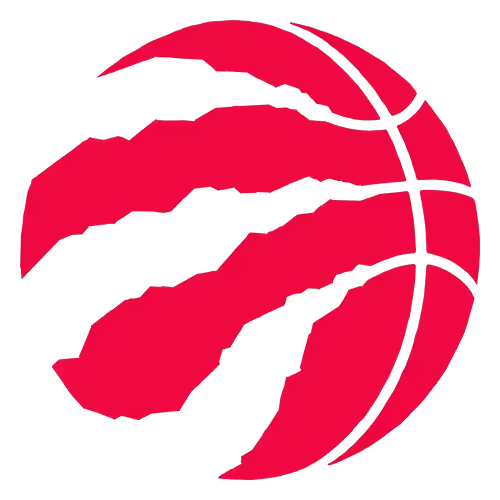
Brandon Ingram, Immanuel Quickley, Scottie Barnes, and RJ Barrett form a foursome that is incredibly tough to defend, but also combines their length and size to give opponents fits on the defensive end.
Toronto is presently riding a seven-game winning streak into Monday’s affair, with five of their wins coming by nine or more points. The Raptors are admittedly taking advantage of a soft portion of their schedule, but have still looked excellent in the process.
Head‑to‑Head / Historical Context
This is already the third meeting between these two teams this year. Toronto is up 2-0 in the season series, having won 126-113 on November 13th and 112-101 back on October 31st.
Cleveland dominated this series en route to a 4-0 sweep last year and had won seven of the eight matchups prior to this season. Both wins by Toronto came on the road in Cleveland, so the Cavs will be hoping to return the favor with this game being played in Toronto.
Key Matchup Breakdown
We don’t know exactly who the Cavs are yet, as star point guard Darius Garland has only suited up for five games this season. Cleveland has dealt with Jarrett Allen and some role players being in and out of the lineup, too.
Allen and Garland’s long-term impact gives Cleveland’s defense and rebounding big boosts, but the offense largely flows through Donovan Mitchell and Evan Mobley.
Mitchell is enjoying a fantastic 2025-26 campaign, as he’s helping the Cavs run at the league’s third fastest pace, while putting up a career-high 30.8 points per game. Mobley has chipped in as Robin to Mitchell’s Batman, scoring 19 points per game on the year.
Cleveland has received plenty of help from other role players, as De’Andre Hunter has poured in over 18 points per game. This offense is top-heavy, but they are fairly spread out and deep beyond their star scorers.
The Cavs like to push the pace to get easy buckets, and they come in ranked 12th in transition scoring and top-three in both three-point attempts and three-point makes per game.
This is a mostly perimeter-based offense, however, as they only rank 25th in points scored inside the paint and don’t produce at the charity stripe (20th) at an elite rate.
Toronto probably isn’t a fun team when it comes to betting on player props, just because they share the wealth (2nd in assists per game) as well as anyone.
This is simply an unselfish group that is very good individually at scoring the ball and breaking down defenses, but is also willing to give up scoring opportunities for the betterment of the team.
It is arguable that lacking one true alpha scorer could come back to haunt them in tense situations (i.e., the playoffs), but so far, they just have a lot of guys who can score at a high level and also don’t mind deferring as needed.
Brandon Ingram paces the team in scoring (21.2 ppg), but he is followed closely behind by RJ Barrett (19.56) and Scottie Barnes (19.44), while Immanuel Quickley (15.94) also is chipping in reliable production.
Just as important, though, all four of these guys are averaging at least 3.94 assists per contest. This team can attack defenses in isolation, and they can do it from 4-5 different options at a high level. This spread out attack keeps defenses guessing, while Toronto does not settle for bad shots – they are killing teams in the paint (4th most interior points per game) and rank 5th in effective field goal percentage.
Despite a balanced and efficient attack, the Raptors actually push the pace (6th) and even execute on defense. Their style limits poor shots and has them passing up three-pointers (27th in three-point attempts), but it’s led them to a very consistent offensive output.
These teams can both play strong defense. Cleveland’s overall numbers are negatively impacted by the long-term absence of Darius Garland, but even despite that, their scoring defense ranks 13th, and they’re middle of the pack or better in transition and interior defense.
Toronto has been a bit better defensively, as their scoring defense ranks 9th and they’ve been elite in transition and top-10 on the glass. Their interior defense (11th) has also been just as good as Cleveland’s.
In terms of pace, these teams both like to run and consistently rank inside the top-10 on the year.
- Toronto’s offense vs. Cleveland’s interior defense: This might be the most intriguing matchup, as the Raptors don’t shoot a lot of threes and enjoy plenty of success inside. Jarrett Allen returning to the floor would give the Cavs a big boost in this matchup.
- Cavaliers outside shooting vs. Toronto’s perimeter defense: These teams are polar opposites as far as how they operate. The Cavs will let it fly from long range (#1 in threes attempted per game) and boast plenty of deadly shooters, but Toronto allows the 4th fewest made threes per game.
- Spida vs. Toronto’s balance: This will be especially interesting depending on the statuses of Darius Garland and Jarrett Allen. Toronto’s balanced attack has been the better option so far in this season’s series, with a 31-point effort from Spida being wasted in the latest showdown.
Darius Garland should be in doubt for this game, as he may not be cleared for back-to-back sets yet. Allen sat out Sunday’s game and should be questionable, too, while Sam Merrill and Lonzo Ball also missed Sunday’s contest.
Toronto sat big man Jakob Poeltl in preparation for this big game, so it looks like there’s a good chance the Raptors will be the far healthier team on Monday night.
Betting Odds & Market Interpretation
Check out the latest Cavaliers vs. Raptors betting odds at FanDuel:
| Team | Spread | Moneyline | Total |
|---|---|---|---|
Cavaliers | -2 (-110) | -130 | Over 237.5 (-110) |
Raptors | +2 (-110) | +110 | Under 237.5 (-110) |
This game is priced as a borderline pick’em. Cleveland is perhaps being overvalued due to name recognition, as they could be severely undermanned on the road on the second leg of a back-to-back set.
The game total suggests a good amount of scoring, leaving bettors to decide if they should bank on season numbers or be concerned about fatigue and injury impact.
From a Bettor’s Lens
I think the value here is fantastic. It comes down to a coin flip for the two teams, of course. Toronto is up 2-0 in the series, is at home, and should be healthier, but will the Cavs actually allow them to take a commanding 3-0 series lead?
The game total feels like the safest bet to target, however. You don’t need to pick a side; you can just bank on two competent offenses that love to push the pace and simply pile up points in very different ways.
Situational Considerations
The 2-0 series advantage is interesting, as it creates a noisy narrative; ie, the Cavs have to get this one. If they don’t, the season series goes to Toronto, and they automatically lose a tiebreaker when it comes to playoff seeding.
The injury situation is definitely dicey. Toronto could always rest some key players after also playing last night, but they figure to have just about everyone on hand, whereas the Cavs will very likely be without some important players.
One more thing for bettors to keep in mind is Cleveland’s road issues. Three of their losses have come on the road this year, suggesting they’re understandably much more comfortable on their home floor. This is also their first road test since November 12th, so getting used to playing at home could hurt them here.
Best Bets & Confidence Levels
| Bet | Rationale | Confidence Level |
|---|---|---|
Over 236.5 (-110) | Both teams are top-6 in pace and top-10 in scoring. The defenses are good, but the offensive production and style of play is enough to make me confident we get a lot of points. | 7/10 |
Raptors +110 | Toronto may simply have Cleveland’s number this year. They’ll be at home, they’re the superior defensive squad, and they play team-friendly ball. | 7/10 |
Odds for Cavaliers vs. Raptors continue shifting as injuries and back-to-back schedules impact betting lines—track every move and compare at our best sports betting sites.
Final Score Prediction & Closing Thoughts
Final Score Prediction: Raptors 124, Cavaliers 121
The first two meetings were relatively easy wins for the Raptors. I think they win again, but the Cavs will not want to go away quietly in this series. Expect a big scoring output from Donovan Mitchell as he tries to will the Cavs to a win, but I like Toronto to pull it out.
The reality is that the Cavs have not been as reliable away from home; they clearly have not matched up well with the Raptors to this point, and they could also be without several key bodies.
Toronto is also in a groove right now. Their winning streak could end at any point, but they’ve won seven straight, and I like their chances to stay hot at home.
17 Craps Bets You Should Never Make (And What to Bet Instead)
Most players lose money at the craps table for one simple reason — they’re betting on things they should never touch. Craps is loud, fast, and full of excitement, and that energy tricks beginners (and even experienced players) into making bets the casino loves.
What most people don’t know is that the craps table is packed with traps. Some bets feel harmless. Some sound fun. Others look like they offer huge payouts. But behind the noise and the bright felt layout, many of these options are quietly destroying bankrolls every single roll.
And here’s the wild part — avoiding the bad bets is often more important than choosing the good ones.
In this guide, we’re breaking down the 17 craps bets you should never make. You’ll see exactly why they’re so dangerous, how the house edge actually works against you, and what smarter alternatives you can use instead.
If you’ve ever wondered why your bankroll disappears faster than it should… or why some players seem to last longer at the table… the answer is right here.
Learn these traps now, and you’ll walk into any craps game with a sharper edge than 90% of players at the table. Ready to roll smarter? Let’s get into it.
The Trap Bets Lurking on Every Craps Table

Before you even get into the flashy center-table bets, the layout itself hides a handful of “trap bets” that look completely harmless. These wagers are printed right on the felt, placed in convenient spots, and sound like normal options that any player would consider.
But here’s the truth: these bets are built to drain your bankroll slowly and quietly.
Players make them because they appear safe. Casinos keep them because they’re profitable. And most beginners don’t realize what they’ve stepped into until they’ve already lost more than they planned.
Let’s break down the worst offenders — and why they’re so dangerous.
1. Any Seven
House Edge: ~16.67%
This is one of the worst bets on the entire table, yet it’s also one of the most tempting during a hot roll. The payout looks solid, but the math is brutal. A 7 has the highest probability of showing up in craps, but that doesn’t make this bet “smart” — it just means the casino priced it aggressively. You’re getting paid far less than the true odds, which guarantees long-term losses.
Better alternative: Pass Line or Don’t Pass. They keep you in the game, not chasing long shots.
2. Hard 4 (2–2)
House Edge: ~11.11%
To win this bet, the shooter has to roll exactly 2–2. Not a soft 4. Not any other combination. Just one extremely rare outcome. Meanwhile, there are multiple losing rolls that take your money instantly. It feels exciting because it pays well — but nearly every Hard Way bet is priced to punish hopeful players.
Better alternative: Place the 4 for a much lower house edge.
3. Hard 6 (3–3)
House Edge: ~9.09%
Hard 6 looks simple enough, but don’t fall for it. There are five different combinations that roll a 6… and only one of them wins this bet. At the same time, seven ways to roll a 7 will wipe it out. You’re betting on a longshot that the casino knows most players don’t fully understand.
Better alternative: Place the 6. Lower risk, better math, more longevity.
4. Hard 8 (4–4)
House Edge: ~9.09**
This is one of the most popular Hard Way bets, but popularity doesn’t equal value. The odds of rolling a hard 8 are tiny, and you’re betting against every soft 8 and every 7 — the two most common killers in craps. Casinos love this bet because it looks straightforward while quietly draining your chips.
Better alternative: Place the 8. Same number, far better return.
5. Hard 10 (5–5)
House Edge: ~11.11%**
Hard 10 is arguably even worse than Hard 4 because of how rare this roll is. You’re betting on a single exact outcome in a game where the dice almost always favor combinations like 6 and 8. The payout tries to lure you in, but the math makes it a losing bet almost every time.
Better alternative: Place the 10 instead of getting sucked into the Hard Way trap.
One-Roll Sucker Bets You Should Avoid

If the trap bets are slow leaks, these one-roll wagers are straight-up landmines. They resolve on the very next toss of the dice — which makes them exciting, but also incredibly dangerous. Casinos love these bets because players chase the big payouts without realizing how tiny the actual win probability is.
The problem? These bets end in seconds, and most of the time they end in a loss. A few hits might feel thrilling, but over any meaningful session, they’ll destroy your bankroll faster than anything else on the table.
Here’s why these single-roll bets are some of the worst decisions you can make in craps.
6. Any Craps (2, 3, or 12)
House Edge: ~11.11%
This bet wins if the next roll is 2, 3, or 12 — and loses on everything else. Three winning outcomes versus 33 losing outcomes is simply awful math. Many beginners throw money here because it sounds like a quick way to score, but all it really does is drain units at high speed.
Why to avoid: It’s a flashy bet with a payout that doesn’t match the real odds.
7. Craps 2 (Snake Eyes)
House Edge: ~13.89%
Snake Eyes looks fun because it’s rare and people love rooting for “the impossible.” But that rarity is exactly why the bet is so bad. You’re trying to predict the single least likely roll in the entire game — and the payout still doesn’t match the true risk.
Why to avoid: You’re giving the house nearly a 14% advantage for a bet that almost never hits.
8. Craps 3
House Edge: ~11.11%
This is another classic sucker bet packaged as a “quick score.” There are only two combinations that make a 3, but dozens that wipe you out instantly. It wins just enough to trick people into tossing a few extra chips out there… and then slowly crushes them.
Why to avoid: It’s a low-frequency win with a high-frequency burn rate.
9. Craps 12 (Boxcars)
House Edge: ~13.89%
Rolling a 12 is rare — incredibly rare. Casinos know this, which is why they’ve priced this bet to perfection on their side. Even though the payout looks tempting, it doesn’t come close to compensating for how infrequently this roll actually happens.
Why to avoid: You’re betting on a statistical longshot with terrible equity.
10. Yo (11)
House Edge: ~11.11%
This bet pops up a lot because dealers shout it with style — “Yo-leven!” But hype doesn’t make it a good wager. There’s only a tiny chance of hitting an 11 on the next roll, and the casino ensures the payout keeps you losing long-term.
Why to avoid: It’s basically a tip bet disguised as a legitimate play.
Dangerous Place Bets & Misleading Table Options
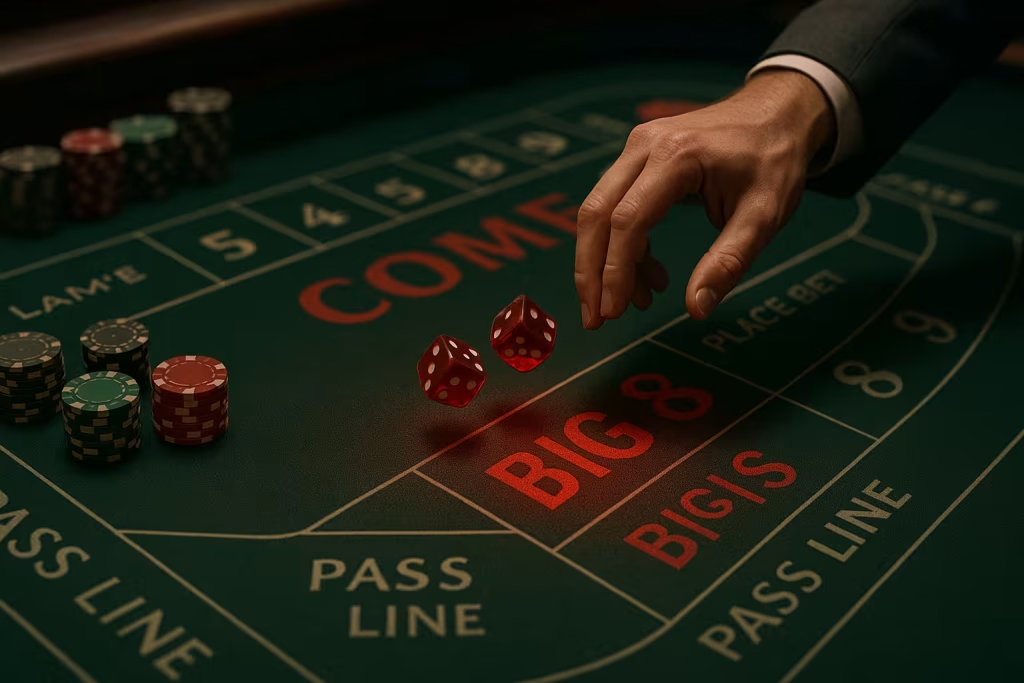
Not every bad craps bet looks flashy or dramatic. Some of the most misleading wagers on the table are actually the ones that feel safe. They sit quietly around the main layout, they look like normal options, and they seem harmless enough that most players don’t think twice.
But here’s the problem: these bets have house edges that are way too high for what they offer — especially when the table already gives you smarter alternatives with far better odds.
These aren’t the worst bets in the casino, but they’re sneaky. They trick players into settling for “good enough” when a much better option is right next to it. Let’s break down the ones you should always avoid.
11. Place the 5
House Edge: ~4.0%
At first glance, placing the 5 looks completely fine. It’s a middle number, it hits often enough, and it doesn’t feel like you’re taking a big risk. But here’s the hidden issue: the payout is priced at a disadvantage compared to the true odds. You’re simply paying too much for what you’re getting.
Players who use the 5 as a “safe number” don’t realize they’re giving the house double or triple the edge they would on smarter bets.
Why to avoid: It’s just bad value. You can do way better with the 6 or 8.
Better alternative: Place the 6 or 8 — the two best value bets on the table.
12. Place the 9
House Edge: ~4.0%
The 9 has the exact same problem as the 5. It’s a decent number in terms of probability, but the casino’s payout structure makes it inefficient. It might hit now and then, but long term, you’re overpaying for an average result.
A lot of players place the 9 just because they want to “cover more numbers.” That mindset is how casinos make their money.
Why to avoid: It looks normal, but the house edge eats your bankroll slowly.
Better alternative: Stick with placing the 6 and 8 — far better returns.
13. Big 6
House Edge: ~9.09%
This is one of the biggest beginner traps in craps. The Big 6 is printed right on the felt in huge letters, which makes new players think it must be important. But here’s the catch: it’s literally the same outcome as placing the 6… except almost three times more expensive in terms of house edge.
Casinos put it on the layout because they know rookies will grab it.
Why to avoid: The payout is identical to a Place 6 bet — but with a much worse edge.
Better alternative: Place the 6. Same goal, better math.
14. Big 8
House Edge: ~9.09%
Everything wrong with Big 6 is also wrong with Big 8. It’s printed boldly on the table, it plays into beginner instincts, and it seems like a quick way to get in on the action. But value-wise, it’s one of the worst bets you can make on one of the best numbers in the game.
It takes skill to win at craps, but avoiding Big 8 takes only awareness.
Why to avoid: You’re paying a massive premium for the exact same outcome as Place 8.
Better alternative: Place the 8 instead — one of the most efficient bets in the entire game.
The Most Misleading & Costly Craps Bets

These next bets aren’t just bad — they’re designed to trick you. They’re often placed in the center of the table, surrounded by bright colors, big payouts, and high-energy dealer calls. They feel exciting. They feel “important.” They feel like they’re where the real action is.
But here’s the truth most beginners never hear:
These center-table bets exist for one reason — to take your chips faster than anything else in the casino.
They look fun because they are fun… for the house. For players, they’re nothing but expensive longshots with house edges that completely destroy long-term results.
Here’s why these are some of the most dangerous bets you can make in craps.
15. The Field Bet
House Edge: 2.78%–5.56% (depending on the casino)
The Field Bet is one of the most deceptive options on the entire table. It’s bold, easy to read, and has a long list of numbers that win — which makes new players think it’s a great bet.
And to be fair, it feels like it hits often. That’s the trap.
Many casinos only pay double on 12 (or sometimes 2), which dramatically tilts the math in the house’s favor. In the long run, the Field is a chip-eater disguised as a “safe” bet.
Why it’s dangerous: It wins just enough to keep you coming back… but loses often enough to drain your bankroll steadily.
Better alternative: Stick with Pass/Don’t Pass or Come/Don’t Come — the true low-edge bets.
16. Proposition Bets (General)
House Edge: Often 10%–17%
Prop bets are the flashy wagers sitting in the center of the table — Hard Ways, Horn bets, Yo bets, and other “fun” options dealers call out to liven the mood. They pay big, have cool names, and feel like they’re part of the real craps experience.
But here’s the honest truth: they’re entertainment, not strategy.
Prop bets almost always favor the house by a massive amount. Over a long session, these bets will chew through your bankroll faster than almost anything else you can do at a casino table.
Why it’s dangerous: They give the illusion of excitement, but the payouts never match the true odds of winning.
Better alternative: Skip the center table entirely unless you’re throwing out a small tip for the dealers.
17. Hop Bets
House Edge: 11.11%–16.67%
Hop bets are the ultimate “just for fun” wagers — you’re predicting a specific dice combination on the very next roll. They’re fast, they’re flashy, and they almost never hit.
The kicker? The payouts are far below the mathematical odds of the outcomes they represent.
Hop bets are basically a turbo-charged way to give your chips to the casino one toss at a time.
Why it’s dangerous: You’re betting on exact-number combinations with the house taking a massive premium.
Better alternative: Avoid all hop bets. There’s simply no strategic reason to ever place one.
Smarter Craps Bets That Actually Make Sense

Now that we’ve covered the landmines, let’s shift to the good news: craps actually has some of the best bets in the entire casino. The game gives players several options with low house edges, fair payouts, and long-term playability. These are the bets that sharp players use to stay in the game longer — and they’re the complete opposite of the flashy traps we covered earlier.
If you want the best chance to grow your bankroll or simply stretch it further, these are the bets worth focusing on every time you hit the table.
1. Pass Line Bet
House Edge: ~1.41%
This is the classic craps bet and one of the safest on the entire layout. You’re betting with the shooter, hoping they establish a point and hit it again. Simple, predictable, and efficient. This is the foundation of most winning strategies.
Why it works: Low edge, easy to follow, and pairs perfectly with Odds bets.
2. Don’t Pass Bet
House Edge: ~1.36%
If the Pass Line is the “player-friendly” bet, the Don’t Pass is the even sharper version. You’re effectively betting against the shooter. While it may feel counterintuitive or less social, the Don’t Pass has an ever-so-slightly lower house edge.
Why it works: Better math long-term — especially combined with Don’t Come wagers.
3. Come & Don’t Come Bets
House Edge: ~1.36%–1.41%
These bets work just like the Pass Line and Don’t Pass but can be placed after the shooter establishes a point. They offer the same strong advantages and let you build a strategic, low-edge stack of bets around the table.
Why they work: They let you play multiple low-edge bets at once without touching high-risk wagers.
4. Placing the 6 and 8
House Edge: ~1.52%
These are the only Place bets truly worth making. Six and eight show up more frequently because of how many combinations can create them. Casinos price them reasonably, making them the most efficient place bets on the table.
Why they work: Frequent hits + low house edge = slow, steady profit potential.
5. Taking Odds
House Edge: 0%
This is the best bet in all of craps — and one of the only bets in a casino with no house edge whatsoever. You can take Odds behind your Pass, Don’t Pass, Come, or Don’t Come bets once a point is established. The payout matches the true mathematical odds of the game.
That’s why casinos limit the maximum amount you can place on Odds… they make no money from it.
Why it works: Because it’s fair. You’re getting a completely even bet with no disadvantage.
Simple, Smart Craps Strategy for Long-Term Success
To keep your bankroll healthy — and avoid the traps we covered earlier — stick to this simple formula:
- Build your foundation with Pass/Don’t Pass: These bets give you structure and consistency.
- Add Odds every chance you get: This is the strongest move you can make in craps.
- Use Come/Don’t Come to scale safely: They let you expand your position without increasing risk.
- Only place the 6 and 8: Everything else is overpriced.
- Avoid all one-roll and proposition bets: They’re flashy but terrible for your bankroll.
This basic strategy will keep you betting like a seasoned player — not a beginner handing chips away.
Conclusion: Play Longer, Play Smarter, Play With Purpose
Craps is one of the most exciting games in the casino, but excitement alone doesn’t keep your bankroll alive. The real advantage comes from knowing which bets to avoid — and which bets actually give you a fighting chance. Once you understand the traps, the game becomes clearer, calmer, and far more fun.
The 17 bets we covered are the fastest way to burn through your chips. They look flashy, they sound exciting, and the table layout makes them feel important. But smart players win by doing the opposite of what the casino hopes you’ll do.
If you stick to the low-edge bets, stay disciplined, and ignore the noise around the table, you’ll put yourself in a far better position than most players who walk up and start firing chips at anything that sparkles.
Quick Recap: The Keys to Smart Craps Play
- Avoid all Hard Ways, one-roll wagers, and center-table prop bets
- Stick to Pass/Don’t Pass and Come/Don’t Come
- Always take Odds — the only true 0% house edge bet
- Place only the 6 and 8
- Focus on long-term value, not flashy payouts
When you’re ready to play online, choosing the right casino matters just as much as choosing the right bets. As new promos and odds become available, the smart move is to compare the most trusted platforms before you roll the dice. Be sure to check out our best craps apps page to find secure, reputable options with strong bonuses and fast payouts.
Tampa Bay Buccaneers vs. LA Rams Prediction & Betting Picks (November 23, 2025)
We get a good one on Sunday Night Football in week 12, where the Los Angeles Rams will host the Tampa Bay Buccaneers as near-touchdown favorites (-7).
Both teams have a ton to play for, as they are in first place in their respective divisions. The battle for the #1 seed in the NFC is alive and well, too. L.A. is presently tied with the Eagles, but an upset win by the Buccaneers would open this race up.
Tampa Bay has the Carolina Panthers breathing down their neck in the NFC South, but solid play and a respectable 4-2 road record makes them a viable underdog pick. This game also sports a healthy 49.5 total, meaning we’re in for a fun scoring environment no matter the outcome.
But what’s the best bet for the Buccaneers vs. Rams clash? There are a few that stand out, but I’ll break down the latest odds and key matchups to find the top plays. Read on for my preferred picks and ultimate Buccaneers vs. Rams prediction.
Game Info Snapshot
- Date & Location: Sunday, November 23rd, 2025 | Kickoff at 7:20 pm ET (NBC) at SoFi Stadium in Inglewood, CA
- Team records entering the game:
- Buccaneers: 6-4
- Rams: 8-2
- Odds (from FanDuel)
- Spread: Buccaneers +7 (-110) | Rams -7 (-110)
- Moneyline: Buccaneers (+300) | Rams (-375)
- Total: Over 49.5 (-110) | Under 49.5 (-110)
This game’s pricing indicates a sizable gap between the Bucs and Rams, not to mention a noted edge for Los Angeles at home. The oddsmakers could also be factoring the cross-country travel for the Buccaneers, not to mention the primetime setting.
Despite the big spread, this is a nice game total, which suggests we should be in for a fair amount of scoring. Both offenses are also plenty capable, which further plays into this line.
Buccaneers vs. Rams Storylines to Watch
There are several storylines to watch for this big NFC tilt on Sunday Night Football. The biggest has to be whether the Rams can exert further dominance and distance themselves as the best team in this conference.
L.A. has certainly looked the part of a legit title threat, but winning home games where they are reasonable favorites tends to be the mark of a champion.
Here are some more Rams vs. Buccaneers storylines to keep in mind:
- Banged Up: As if the Buccaneers weren’t going to be challenged enough against a loaded Rams offense, they’ll be without stud defensive back Jamel Dean, among others. Dean’s absence could be felt for a defense that leans heavily on forcing turnovers (1.6 per game).
- Turnover Battle: If Tampa Bay’s defense is going to lose out on some playmaking, they may need to make sure they take extra good care of the football. They do that at a high level (4th fewest giveaways), but the Rams (7th fewest) aren’t far behind.
- Healthy Returns: The Buccaneers are banged up on defense, but they might get reinforcements on offense. Both Chris Godwin and Bucky Irving practiced in limited fashion this week and have yet to be ruled out for Sunday Night Football.
Team Profiles

Tampa Bay Buccaneers
The Buccaneers have been rock solid all year, as they got off to a nice 3-0 start, and have held strong to a respectable 6-4 record.
Injuries have begun to catch up with the Bucs, as they got smoked by the Bills last week, and have lost three of their last four.
On the year, this is a dynamic offensive team when at full strength. Here’s a quick look where they’ve stood out in key areas so far:
- Pass Happy: The Bucs have a capable rushing attack, but it’s been banged up for a while now. They tend to pass a lot more than they run (57% pass rate), and it’s kept them among the better offenses (15th in passing and 17th in yards per pass) through the air.
- Max Protect: Tampa Bay does a fantastic job at both protecting quarterback Baker Mayfield and limiting turnovers. The Bucs have the 10th lowest sack rate, while Mayfield has his squad ranking 3rd with one of the lowest interception rates (0.88%).
- Stiff Front: The Bucs have weakened in this regard in recent weeks, but on the year they’ve been a tough defense to run on. Their yards per rush allowed are at the league average (4.2), but they come into week 12th ranked 10th in rushing yards allowed per game.

Los Angeles Rams
Los Angeles also got off to a nice start early in the year, as they started 2-0 and never really looked back. They did lose to the Eagles in a tight 26-33 game in week three, while their other loss is a three-point defeat by the hands of the NFC West rival 49ers.
That loss to Philly is key, as the Eagles are also 8-2 and own the tiebreaker. The Rams need to keep pace and hope they end the regular season with the better record if they want the #1 seed in the NFC.
Overall, this has been an extremely balanced team that ranks inside the top-10 in scoring both offensively and defensively. Matthew Stafford is also piecing together a legit NFL MVP caliber campaign.
Here’s how the Rams have stood out on the year:
- Unstoppable: The Rams are not an easy team to get rid of. If you hold them to fourth down, they can still kill you at an elite rate (4th best conversion rate) and they tend to finish the job (7th) when they get inside the 20.
- Pass Centric: L.A. has excelled in every way through the air. Stafford has been ablaze, putting up 27 passing scores to just two interceptions. The Rams rank inside the top-10 in yards per pass, sack rate, interception rate, and passing yards per game. They throw almost 57% of the time and everyone knows it – yet nobody can consistently stop them.
- Stingy Front: The Rams do a fantastic job against the run on a per carry basis. Overall volume works against them slightly, but they still own the league’s 11th best run defense and are only allowing 3.9 yards per rush (6th).
Key Buccaneers vs. Rams Matchups & Angles
Check out the key Rams vs. Buccaneers vs. matchups:
- Rams passing offense vs. Buccaneers secondary: Jamel Dean hurts the Bucs a lot here. Tampa Bay does force a good amount of turnovers, but their 21st ranked pass defense will absolutely need to be active in that area to have success in this matchup.
- Buccaneers rush offense vs. Rams run defense: Even if the Bucs get Bucky Irving back, it’s unknown how much he’ll be limited. How successful he can be – or how much the Bucs even try to run – against a stingy L.A. defensive line is a key matchup to consider.
- Can Anyone Stop Puka Nacua?: The Rams have two elite wide receivers in Puka Nacua and Davante Adams, but without a key defensive back, I’m not sure the Bucs will slow down either of them. That could especially mean big things for Puka, who has 7+ catches in seven different games this season.
Betting Trends & Odds Context
Take a look at the latest Buccaneers vs. Rams odds, per FanDuel:
| Team | Spread | Moneyline | Total |
|---|---|---|---|
Buccaneers | +7 (-110) | +300 | Over 49.5 (-115) |
Rams | -7 (-110) | -375 | Under 49.5 (-105) |
Take a look at some key betting trends for this showdown:
- Public Betting: All the action is favoring the Rams right now. L.A. is getting 87% of the bets and 873% of the money.
- Record History: These two sides have only played each other 29 times, with the Rams holding a commanding 19-10 series edge. The Bucs won the last meeting (16-13) in 2022, but L.A. has claimed three of the last four games.
- ATS Tidbits: Tampa Bay is just 5-5 against the spread, but they’re 4-2 ATS on the road and 3-3 ATS as the underdog. The Rams have been great (7-3) against the spread and are 3-2 ATS at home and 7-2 against the spread when favored.
Best Bets for Rams vs. Buccaneers
Pick 1: Buccaneers ATS +7 (-110) – 7/10 Confidence
Why We Like It
My favorite Buccaneers vs. Rams pick is for the Bucs to beat this big spread. Tampa Bay has been solid on the road, could be getting some key players back, and have a lot to play for. This is also a pretty big spread in a game that could easily go down to the wire.
Risks/What to Watch
The Rams have been pretty dominant ATS, are at home, and grade out as the better team across the board. They have won by 7+ in six different games, so blowing teams out isn’t abnormal for them.
Pick 2: Over 49.5 (-110) – 7/10 Confidence
Why We Like It
Tampa Bay’s defensive bite is lessened by injuries. I think they can keep this close, but shutting down a dynamic Rams offense that puts up 27.2 points per game seems unlikely. The Bucs are plenty capable (25.2 points per game) of showing up in a tight shootout.
Risks/What to Watch
Los Angeles has the far better defense and they’re at home with just as much to play for. They own the NFL’s second best scoring defense, which could negatively impact things for Over bettors.
Pick 3: Prop Play – Puka Nacua Over 7.5 Receptions (+106) – 7/10 Confidence
Why We Like It
Puka Nacua seems to get at least seven grabs almost by default. He has several other games where he has 10+ as well. He’s been on the quiet side in recent weeks, but this matchup sets up pretty well for the L.A. passing game. I can see him smashing this nice plus money prop.
Risks/What to Watch
Los Angeles is loaded and dynamic. It could always turn into a Kyren Williams or Davante Adams game. A blowout would negate the necessity of passing a lot or force-feeding Nacua, too.
Odds lines for Buccaneers vs. Rams continue shifting as bettors react to injuries and late-week action—track changes closely and compare them at our top football betting sites.
Final Verdict: Rams Stay in Play for the #1 Seed
I think we’ll get these teams about right where we expect in terms of production and scoring. L.A.’s stiff run defense may not have a huge hold on the Bucs due to their tendency to air it out, while the Bucs are going to be too banged up on defense to slow down Matthew Stafford.
That should equate to a Rams home win, but Baker Mayfield and co. have enough weaponry to keep this one interesting. That should lead to the Buccaneers beating this 7-point spread, and if both teams can hover around their scoring averages, we can see the Over deliver as well.
Ultimately, home field edge, talent, and matchups all favor the Rams. There isn’t much value in betting on L.A.’s ML, though, so we should take advantage of these other bets.
Final Score Prediction: Rams 27, Buccaneers 24
Philadelphia Eagles vs. Dallas Cowboys Prediction & Best Bets (November 23, 2025)
The Dallas Cowboys may be looking at their last gasp on Sunday when they’ll be +142 underdogs at home against the Philadelphia Eagles.
Dak Prescott and co. are coming off a big win over the Las Vegas Raiders, but will be facing a 3-point spread at AT&T Stadium with the 8-2 Eagles coming to town.
An up-and-down season has materialized into a pedestrian 4-5-1 record that threatens to derail their playoff hopes. Can they upset an Eagles team they played closely back in week one, or is a season sweep the last straw on what will ultimately be a lost year?
I’ll go over the latest odds and key matchups to point you in the right direction. Read on for my favorite bets in this game, as well as my Eagles vs. Cowboys prediction.
Game Info Snapshot
- Date & Location: Sunday, November 23rd, 2025 | Kickoff at 3:25 pm ET (FOX) at AT&T Stadium in Arlington, TX
- Team records entering the game:
- Eagles: 8-2
- Cowboys: 4-5-1
- Odds (from DraftKings)
- Spread: Eagles -3 (-112) | Cowboys +3 (-108)
- Moneyline: Eagles (-162) | Cowboys (+136)
- Total: Over 47.5 (-115) | Under 47.5 (-105)
The odds give Dallas some credit at home. Part of the tight spread probably has to do with the previous meeting in this series, as well as the magnitude of this game for a desperate Cowboys team.
The game total could be tricky. The Cowboys have a dynamic offense and one of the worst defenses in the league, but Philly’s games have been brutal for Over bettors lately.
Storylines to Watch
The main Eagles vs. Cowboys storyline is easily whether Dallas can get the upset win and keep their playoff hopes alive. Getting back to .500 would keep them in the running for the final spot in the NFC playoff bracket, but a loss could effectively end their season.
Here’s a quick look at some other Cowboys vs. Eagles storylines to consider:
- Hot Streak: Philly comes in red hot as winners of four straight. They are feeling comfortable atop the NFC East, so will they stay on fire, or overlook the Cowboys?
- Disgruntled: An ongoing storyline has been the demeanor of diva Eagles wide receiver A.J. Brown, who appears to be disappointed with his role. He’s made comments about himself and other teammates recently, suggesting his displeasure and creating a mild rift for the team to manage.
- Improved Defense: A running storyline for Dallas has been their terrible defense. They made some big moves ahead of the NFL trade deadline, however, and looked quite good last week. Was that more about their overhauled unit, or a tasty matchup with a bad Raiders team?
Team Profiles
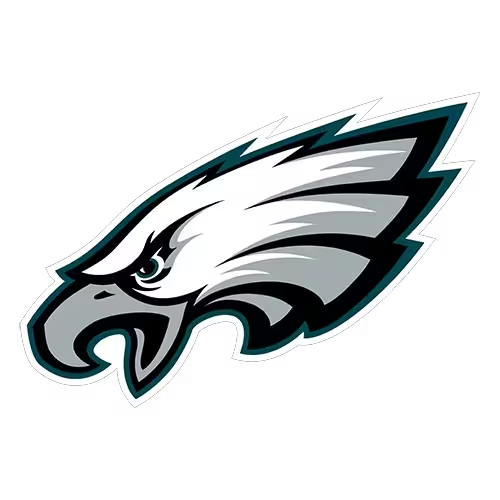
Philadelphia Eagles
The Eagles and Cowboys faced off in week one, with the defending Super Bowl champions prevailing in a closer-than-expected game. Philadelphia has gotten the job done more often than not since then, but it hasn’t always been pretty.
Jalen Hurts and co. are 8-2 and well on their way to another Super Bowl run, but they do have some things to clean up along the way. Here’s a look at where they’ve stood out to this point, however:
- Unstoppable: The one constant for the Eagles is the use of the Tush Push and their insane effectiveness inside the 20. They own the league’s best red-zone conversion rate (75%) and are really tough to stop at the goal-line.
- Ground Control: This is still a team that wants to be as balanced as possible, lean on the run, and grind defenses to a pulp. They’re still plenty successful at executing their style of play (2nd in rush rate), but the production hasn’t come as easily as it did last year.
- Mr. Perfect: Certainly, owning the league’s 2nd-lowest pass rate has something to do with it, but when called upon, Jalen Hurts doesn’t throw interceptions. Philly has just a 0.37% interception rate as a team, ranking first in the NFL.

Dallas Cowboys
The Cowboys got tripped up by Philly in week one, but responded like only they know how; by barely beating the New York Giants in overtime, 40-37. A few weeks later, they battled the Green Bay Packers to a 40-40 tie.
All of this is to say Dallas can ball, but their defense has really hurt them over the course of the season. They did make some major adjustments recently, though, so it remains to be seen if it was a temporary spark or a lasting change they can parlay into sustained success.
Either way, here’s where they’ve thrived in 2025:
- Big Plays: It shouldn’t shock anyone that Dallas can move the ball effectively. They rank 5th in yards per play and they also know how to finish the job (2nd in points per game). They’re not an easy offense to stop.
- Max Protect: Give credit where it’s due. Despite having the league’s 8th highest pass rate, the Cowboys have done a fantastic job protecting their quarterback and rank 5th in sack rate allowed.
- Leg of Death: As great as they are offensively, the Cowboys don’t stop killing you if they can’t cross the 40. Kicker Brandon Aubrey is insanely accurate (2nd in FG conversion rate) and may have the biggest leg in the league.
Key Matchups & Angles
Check out the key Eagles vs. Cowboys matchups:
- Cowboys pass protection vs. Eagles pass rush: Dallas has protected Dak Prescott well for much of the year, but Philly has been abusing opposing QBs lately. If Dallas can’t keep him off his back, they’ll be in serious trouble.
- Philly’s rush offense vs. Cowboys run defense: How effective the Eagles can be on the ground will likely be the key to the game. Is Dallas actually that much improved? If not, Saquon Barkley could run wild against the NFL’s 24th-ranked run defense.
- Eagles RZ offense vs. Cowboys RZ defense: Even if the Cowboys are better on defense and limit overall production, can they stop Philly’s top-ranked red-zone offense? Considering they allow scores at a near-67% clip (29th), my guess is no.
Betting Trends & Odds Context
Take a look at the latest Eagles vs. Cowboys odds, per DraftKings:
| Team | Spread | Moneyline | Total |
|---|---|---|---|
Eagles | -3 (-112) | -162 | Over 47.5 (-115) |
Cowboys | +3 (-108) | +136 | Under 47.5 (-105) |
Take a look at some key betting trends for this showdown:
- Public Betting: Everyone is backing Philly. The Eagles have gotten 89% of the bets and 84% of the money so far.
- Record History: These teams have a rich history. They’ve faced each other 133 times, with Dallas leading, 74-59. Philly has dominated lately, though, winning the most recent game and each of the last three.
- ATS Tidbits: The Eagles have been strong (7-3) against the spread, with a 3-1 mark as road favorites. Dallas has gone just 5-5 against the spread, but are 3-1 ATS as the underdog.
Best Bets for Eagles vs. Cowboys
Pick 1: Cowboys ATS +3 (-108) – 7/10 Confidence
Why We Like It
Dallas is at home, desperate, and they played Philly very well the first time around. They also may have an improved defense, plus Eagles games have gone down to the wire the last two weeks.
Risks/What to Watch
Divisional games can be unpredictable. Philly is still the better team, and they have the #1 seed in the NFC to worry about. They should still be motivated to win.
Pick 2: Under 47.5 (-105) – 7/10 Confidence
Why We Like It
Normally, I’d be smashing the Over in a Cowboys game. However, Philly plays a slow, boring brand of football, and their last two games both totaled under 26 points. Throw in a potentially improved Dallas defense, and this bet could get weird.
Risks/What to Watch
If the Dallas defense is still bad, this bet will look silly. Despite the way they play, the Eagles are still plenty explosive, as they’ve scored 30+ points three different times this year.
Pick 3: Prop Play – Jalen Hurts Anytime TD (-115) – 7/10 Confidence
Why We Like It
Philly loves to run the Tush Push play when they get to the goal-line, and they own the league’s best RZ scoring offense. They turn to Hurts often, as he scored on the ground just last week and has six rushing touchdowns on the year.
Risks/What to Watch
Dallas might be a little better up front now, and touchdowns can be tough to predict. It’s always possible Hurts throws some touchdowns or Philly uses Saquon Barkley near the goal-line instead.
Odds lines for Eagles vs. Cowboys continue to shift as bettors react to late-week movement—track those changes closely and compare them at our top football betting sites.
Final Verdict: Cowboys Stay Close, Eagles Stay Hot
Dallas played Philadelphia close in week one, and given what’s at stake, I think they’ll do it again. However, that doesn’t guarantee a victory. Philly has won two close games in a row against better teams, after all.
Even if Dallas does get the upset, we can hedge our bets if we bet on the Eagles, both with Dallas ATS and with the Under. I also think with the Eagles likely finding enough success in this matchup to win again, a Hurts rushing score is as good a bet as anything in this game.
Final Score Prediction: Eagles 20, Cowboys 17
Arizona State vs. Colorado Prediction & Top Betting Picks (November 22, 2025)
The Colorado Buffaloes will hope to finish a disappointing season strong down the stretch, but they won’t be favored to get a win on Saturday (+240 underdogs) against the Arizona State Sun Devils.
It’s been a trying season for Deion Sanders’ crew, as year one without the likes of Shedeur Sanders and Travis Hunter has resulted in a rough 3-7 mark. The Buffaloes will be at home, but they look overmatched on paper and have also gone just 3-3 on their home field.
Arizona State enters Saturday as 7.5-point favorites, which is fairly telling since they’ll be on the road. The Sun Devils are in solid form, however, and technically still have a shot at winning the Big 12 title.
This matchup looks fairly straightforward on paper, but I’ll look through the latest odds for any edge we can find. Along the way I’ll point to the best bets for this contest, as well as my ultimate Arizona State vs. Colorado prediction.
Game Basics & Context
- Matchup: Arizona State Sun Devils (7-3) vs. Colorado Buffaloes (3-7)
- Date & Time: Saturday, November 22nd, with kickoff at 7:00 pm CT (8:00 pm ET)
- Venue: Folsom Field in Boulder, CO
- How to Watch: The game will be broadcast on ESPN2
Team Record
- Arizona State is 7-3, 5-2 in the Big 12.
- Colorado is 3-7, 1-6 in the Big 12.
Betting Odds
Check out the latest Arizona State vs. Colorado odds, per FanDuel:
| Team | Spread | Moneyline | Total |
|---|---|---|---|
Arizona State | -7.5 (+104) | -255 | Over 46.5 (-114) |
Colorado | +7.5 (-128) | +215 | Under 46.5 (-106) |
Rivalry & Venue Context
This is not a very storied rivalry, as the Sun Devils and Buffaloes have only faced off 13 times before. It’s been mostly Arizona State, as they lead the all-time series, 9-4.
Colorado did steal a win in the most recent meeting, of course, winning a tight 27-24 shootout back in 2023. Arizona State won the game before that (42-34), giving bettors a look at what has historically been a competitive matchup with some good scoring.
The Buffaloes lost the most recent meeting in this series at their home field and are just 3-3 here on the season.
Why This Game Matters
This game is meaningless for Colorado, short of trying to end the year on a high note and give their hometown fans a win. They’re out of bowl contention and have nothing but pride to play for.
Rivalry games technically can always mean something, but this game is actually a big deal for Arizona State. They are 5-2 in the Big 12 and technically could still win the conference title. That’s probably a pipedream, but a bowl game certainly is not.
Team Profiles

Arizona State Sun Devils
The Sun Devils are not exactly elite on offense, but they are quite steady. They got off to a nice 1-0 start by dropping 38 points in week one, but that would be the most points they score in a game all year.
Each of their losses are pretty reasonable, as they lost by four to Mississippi State in week two and fell by eight to Houston a few weeks ago. Their only other loss was a 42-10 blowout, but came against a good Utah squad.
Overall, the Sun Devils are very competitive and balanced and boast a defense good enough to keep them in most games. Here’s a quick look at where they stood out the most this year:
- Ground Control: The Sun Devils rack up the yardage on the ground, putting up over 179 rushing yards per game (35th). That’s even more impressive when you consider they’re not even inside the top-50 in rush rate.
- Bubble Wrap: Along with a balanced offense, Arizona State is elite at avoiding negative plays. They rank 6th in sack rate allowed and are also committing the 12th fewest turnovers in all of college football.
- Sniff it Out: On the other side of the ball, the Sun Devils have a really strong run defense that allows just 3.5 yards per carry (27th) and plays into a suffocating red-zone unit that does not buckle (26th) very often.

Colorado Buffaloes
The Buffaloes obviously lost some star talent to the NFL Draft over the offseason, and they’ve struggled to effectively replace that production and continuity.
Unfortunately, this just hasn’t been a very good team. The offense lacks explosiveness or consistency, while the defense allows 30 points per game (96th).
At 3-7, it doesn’t take much to see that hasn’t translated into a great year. They do get credit for only losing to Georgia Tech by seven back in week one, while they have yet to fully mail it in (lost 29-22 to West Virginia last game).
It’s been ugly, but here are a few spots the Buffaloes have stood out:
- Down the Field: Colorado wants to be good at running the football (52% rush rate), but they’ve been inefficient. They’ve been passable (7.2 yards per play) through the air, however.
- Containment: There isn’t much to get excited about the Buffaloes on defense, but they at least have limited opposing passing attacks to a certain degree (49th against the pass).
- Opportunistic: When things have gone right, Colorado tends to pop up with a big play on defense. They’re not elite at it by any means, but they force 1.2 turnovers per game (78th) and it can help them stay competitive.
Key Matchup Angles
Consider the following key Colorado vs. Arizona State matchups:
- Arizona State’s rushing offense vs. Colorado’s run defense: The obvious key to this contest is the Sun Devils’ ground game. Running back Raleek Brown (823 rushing yards) leads this offense into a soft matchup, as Colorado allows a staggering 210.9 rushing yards per game (129th!).
- Colorado’s RZ offense vs. Arizona State’s RZ defense: The Sun Devils only allow a red-zone score 78% of the time. Colorado is actually very good (28th) at finishing drives when in scoring position.
- Arizona State’s o-line vs. Colorado’s pass rush: It doesn’t stand out as a strength for the Buffaloes (112th in sack rate), but if they can exploit a shaky Arizona State offensive line (110th in sack rate allowed), they could have an edge.
Betting Insights & Trends
Arizona State has a nice record, but they’ve been weak (4-5-1) against the spread. The Sun Devils are just 1-4-1 ATS when favored, and they’re just 2-2 against the spread on the road.
Colorado is as bad against the spread as they are at actually winning games. They’re 3-6-1 ATS overall, while they are 2-5 against the spread inside the Big 12 and 2-6 ATS as the underdog.
Arizona State is trending in a positive direction, winning two straight and three of their last four. Colorado is going the other way, as they have lost three in a row and five of the last six.
Best Bets & Confidence Levels
Check out my top Arizona State vs. Colorado picks:
| Bet | Recommendation | Confidence Level |
|---|---|---|
Arizona State ATS -7.5 (+104) | The Sun Devils aren’t great ATS, but I think they cover here. Colorado is dead in the water, and this is a total mismatch. Arizona State should be able to run at will, and Colorado’s defense is pathetic. | 7/10 |
Over 46.5 (-114) | Arizona State’s offense isn’t elite, but they have a clear matchup edge against a bad defense that allows 30 points regularly. Colorado should be able to do enough to contribute to the Over. | 7/10 |
Prop Play – Raleek Brown Over 70+ Rushing Yards (-146) | Brown hasn’t topped this mark since in any of his last five games, but he’s come awfully close. We know he has upside as a rusher, and the matchup is as good as it gets. | 7/10 |
- Primary Pick: Arizona State ATS -7.5 (+104)
- Secondary Pick: Over 46.5 (-114)
Big 12 games can be tough to gauge, and this spread is a tad ambitious. However, Arizona State has the edge on both sides of the ball and has an incentive to take care of business while leaving no doubt.
Colorado’s offense should be able to do just enough to combine with their horrific defense to get total bettors where they need to go.
While Raleek Brown hasn’t converted this exact rushing yardage total in a bit, he does have three 100+ yard rushing days to his name in 2025. In this spot, I would honestly be comfortable doing a ladder bet with him. If you want to play it safer, hammer him at 60+ for -215 at FanDuel.
Virginia vs. Duke odds can shift fast — monitor every line move, compare spreads and totals, and lock in the best value before kickoff at the top football betting sites.
Risk Factors & What Could Go Wrong
Things don’t always go as planned when betting on college football. Here’s why my Arizona State vs. Colorado bets could fail:
- Rivalry Setting: These two teams do know each other and have played each other pretty well in the last two meetings. That’s enough to potentially mess with my ATS pick.
- Nothing to Lose: Colorado could mess with my picks if they decide to play spoiler. They did put up a fight in their last game, after all.
- Defensive Battle: I think the Sun Devils dominate on the ground and run up the score, but they have topped this total just once in their last four games. A lower-scoring game isn’t out of the question.
Putting Our Pick on the Board: Here’s How It Plays Out
Final Score Prediction: Arizona State 30, Colorado 17
The Buffaloes will do just enough to get us to the Over. They’re at home and showed last week they still have some fight, so I’ll give them some credit.
However, the Buffaloes are possibly missing some key defenders and may even be without some starters on the o-line. They were already looking at a mismatch, but if some of their main guys end up sitting, this thing tilts way further toward the Sun Devils.
Arizona State can win this game from anywhere on the field, but the spot they’ll dominate is in the trenches and on the ground. I think that gets them the win, has them cover, and gives us a decent scoring output. If that all works out – and maybe even if it doesn’t – the matchup is so good that Raleek Brown can hit this rushing yardage prop in his sleep.
Bogdan Grad vs. Luke Riley Prediction & Betting Picks (November 22nd, 2025)
The long-awaited debut for rising MMA prospect Luke Riley will come at UFC Qatar, where the powerful striker will be a -280 favorite to defeat Bogdan Grad.
Riley comes into this fight unbeaten at 11-0, having won eight of his fights with his fists. Grad is no slouch, of course, as the 30-year-old has 12 finishes in 15 wins.
Riley is undeniably the more exciting talent, but the combination of both fighters’ striking and tendency to end fights early has everyone eager to see how this one plays out. Wondering if Grad is worth betting on, or looking for the preferred Luke Riley vs. Bogdan Grad pick?
I’ll walk you through the latest odds and key factors, while pointing out the best bets en route to my final Luke Riley vs. Bogdan Grad prediction.
Event Overview
- Event: UFC Qatar
- When: Saturday, November 22
- Where: ABHA Arena, Doha Qatar
- Schedule: Prelims Card – 9:00 AM CT (10:00 AM ET)
- How to Watch: Streaming on ESPN+
- See the full UFC Qatar card
Current Betting Odds & Market Snapshot
Check out the Bogdan Grad vs. Luke Riley odds over at FanDuel:
| Bet | Odds |
|---|---|
Bogdan Grad | +220 |
Luke Riley | -270 |
Fight Goes the Distance | Yes (+114) | No (-146) |
Method of Victory | KO/TKO (-110) | Submission (+850) | Points (+105) |
Total Rounds | Over 1.5 (+125) | Under 1.5 (-160) |
What the Odds Tell Us
The latest Luke Riley vs. Bogdan Grad odds suggest Riley is a safe bet to get the win. The finishing ability from both sides plays into this bout being a poor bet to go the distance, while Riley’s striking background makes a knockout the most likely method of victory.
Despite Riley’s elite finishing ability and him being the favorite, the total rounds wager is split, giving equal value to bettors.
Matchup Preview & Fighter Profiles
Bogdan Grad (15-3)
Grad is actually not a great debut matchup for Riley in the sense that he has shown incredible toughness, solid defense, and is a pretty disciplined fighter.
While perfectly capable on the feet, Grad does mix in some grappling ability, giving him the option to try to take this fight to the ground. He has three submissions to his name, and if he isn’t using his fists standing up, he can use them to ground and pound his opponent to death.

The problem here is that Grad is not a better striker than Riley, so if he fails in his takedown attempts or simply opts to stand and trade, he’s probably in trouble. He also wasn’t on top of his game in a Decision loss to Muhammadjon Naimov his last time out.
Luke Riley (11-0)
Riley is an explosive striker who offers plenty of combination strikes, elite stamina, and excellent pacing. He is not going to get out-worked, and as long as he keeps the fight standing up, he probably isn’t going to get out-punched, either.
He has a little less experience than his opponent, both in sheer volume of bouts fought and within the UFC. There’s also a negative connotation with Cage Warriors prospects in general, but I’m not very afraid of that here.
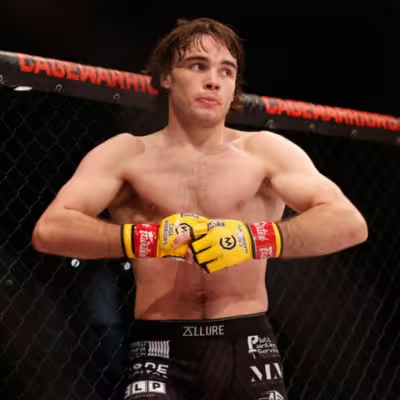
While the competition Riley has faced isn’t elite, he’s done a great job preventing takedowns, and even when he has been in bad spots, he always finds a way out and can deliver excellent counter moves.
Not being a real threat on the ground is always cause for pause, but Riley wants the fight to play to his main strength. Provided he can keep it where he wants it, there’s little reason to expect him to lose.
Tale of the Tape
| Bogdan Grad | Luke Riley | |
|---|---|---|
Record | 15-3 | 11-0 |
Height | 5’8” | 5’9” |
Reach | 70” | 69” |
Stance | Orthodox | Orthodox |
Style | Striker | Striker |
This is a pretty good matchup and a nice first test for Luke Riley’s UFC debut. Bogdan Grad has a background in karate and Jiu-Jitsu, so while his usual style is striking, he might be a bit more advanced than Riley.
At least so far, Riley has been strictly a striker. He has a Muay Thai background and picks his spots, setting this one up to be a striker’s duel. As far as height, reach, stance, and style, this matchup is a bit of a wash.
Key Matchup Factors to Watch
We have two explosive strikers on our hands. The matchup may be as simple as that, but there are a few key Luke Riley vs. Bogdan Grad matchup details to keep in mind:
- UFC Debut: You just never know what to expect with a UFC debut. Riley has dominated in the lower ranks, and Grad has only fought two times under the UFC banner. Riley’s lack of experience could work for or against him here.
- Recent History: Judging just by record and recent form, Riley is the guy bettors will naturally lean toward. He has never been beaten and has finished three of his last four opponents.
- Hype Train: The hype is heating up for Riley, who is a coined Paddy Pimblett protege and has a high ceiling in the UFC. Of course, as noted, Cage Warriors prospects can flame out quickly, so it’s always possible that’s all he is – hype.
Best Bets & Betting Strategy
Check out my top Bogdan Grad vs. Luke Riley bets at UFC Qatar:
| Bet | Reasoning | Confidence Level |
|---|---|---|
Method of Victory – KO (-110) | Riley is going to do everything he can to keep the fight on the feet, where he has a clear edge and a high KO rate. Even if I am wrong and Riley fails, Grad’s 9 KO wins can bail us out here. | 8/10 |
Under 2.5 Rounds (-112) | With 20 total finishes between these guys, I don’t see this one going the distance. | 9/10 |
Luke Riley ML (-280) | The moneyline is a bit rich, but Riley should get a KO and is perfectly capable of out-scoring Grad. This is best reserved as part of a UFC Qatar parlay, though. | 8/10 |
Odd lines keep shifting for this matchup, making value harder to track—stay updated and compare betting edges while checking our top-rated sportsbooks.
Risk Factors & Things to Watch
Things can go wrong when betting on a high-variance sport like MMA. Here’s why our Riley vs. Grad picks could fail:
- Slow Fight: The explosive nature and style of both of these guys has me thinking it ends early, but Riley can be patient at times, and Grad could also choose to be extra careful – leading us to a boring Decision.
- Reverse KO: Riley is lethal with his power, but Grad can get knockouts, too. It’s always possible that Riley’s welcome to the UFC isn’t a kind one.
- Newbie: The obvious risk with this fight is trusting the uber-hyped Riley. He has looked amazing, but you never know quite what to expect in anyone’s UFC debut.
The Bottom Line: Someone Is Getting KO’d
I am calling my shot with Luke Riley impressing with a knockout in his UFC debut. He is really good with pace, pressure, and patience. And when there is an opening, he typically finds it and makes really good use of it with placement and power.
Riley is simply the more dangerous fighter here. His ML is a bit rich, so I’d just tack that onto parlays, but it also feels like one of the safer UFC Qatar bets you can make.
There’s always the chance he gets upset, of course, so I like this one to end within 2.5 rounds to hedge our bets a bit. If Riley does lose, it’ll likely be due to Grad getting him when he doesn’t see it coming.
If Riley wins, however, it’s almost definitely coming via KO. I like the knockout prop (-110) the most, followed by the rounds and then Riley to win.
Final Prediction Summary
- Total Rounds Under 2.5 (-112) | Confidence: 9/10
- Method of Victory: KO/TKO (-110) | Confidence: 8/10
- Fight Winner: Luke Riley -280 | Confidence: 9/10
Survivor 50 Early Odds & Winner Prediction – Who Has the Best Shot?
Survivor Season 50 is already shaping up to be one of the biggest events in reality TV history. A massive returning-player cast. Fan-voted twists. And a premiere date set for February 2026 that has fans buzzing months before the first torch is lit.
But here’s the real question…
With 24 veterans returning and a brand-new game format, who actually has the best shot to win it all?
The early chatter points to the challenge beasts. Others swear this is finally the season a “middle-of-the-pack” strategist wins. And then there’s one name—one unexpected name—that keeps surfacing the deeper we analyze the cast.
By the end of this article, we’re going to reveal that one mystery player who we believe has the best shot to become the Sole Survivor in Season 50.
But first, we need to look at the field, the format, and the early projected odds.
Let’s dive in.
What Makes Survivor 50 Different (and Harder to Predict)
Season 50 isn’t just another season of Survivor — it’s a completely different animal. Even longtime fans who think they can “read the edit” or forecast tribe dynamics are already scratching their heads. The structure of this season makes early predictions harder, not easier, and that’s what makes it so much fun to analyze from a betting angle.
For starters, the stakes are higher. This is a historic season. Production knows millions of extra eyes will be watching, so you can expect more twists, more chaos, and more unpredictable storytelling than normal. But that’s only one piece of the puzzle.
The real challenge comes from how the cast, format, and fan influence collide in a way we haven’t seen before.
A Massive All-Returning Player Cast (24 Veterans)
A regular season has 18 players. “New era” seasons have 18 players. But Season 50? It jumps to a massive 24 returning players, all of whom:
- already know the game
- have reputations
- carry threat levels
- have past alliances or grudges
- understand how to navigate twists and advantages
This instantly blows up most prediction models.
Why? Because returning players don’t behave like new players.
They don’t freeze under pressure. They don’t overplay on Day 1. And they don’t underestimate others. Every move is sharper, faster, and more intentional — which makes the early vote-outs nearly impossible to predict.
The “Fan-Voted Elements” Twist Changes the Meta
Season 50 includes mechanics that were influenced by Survivor fans. That means the game’s DNA may shift in ways that help certain types of players and punish others.
For example, fans may push the game toward:
- More emphasis on challenge performance,
- Fewer overly complicated idol/advantage trees,
- More transparency in strategy,
- More classic Survivor elements,
- Or possibly new twists designed around popularity or visibility.
This matters for predictions because players with strong social presence or a “fan-friendly profile” might get an edge baked into the game itself. Meanwhile, notorious villains or sneaky strategists could find themselves working uphill from Day 1.
This is something we’ve never had to account for before.
Threat Management Has Never Been Trickier
In most seasons, the winner is someone who either:
- flies under the radar early,
- dominates late, or
- lands in the right alliance at the right time.
But in Season 50, with so many big names and returnees:
Everyone is a threat — and also no one is a threat.
Big legends will get targeted, sure, but medium-threat players are also more dangerous than in a normal cast. And even “quiet” contestants might get pegged as under-edited threats ready to explode mid-game.
Predicting how the early boots will shake out is almost impossible until we see the tribe divisions.
Bigger Game = More Variance
With 24 players, the game becomes more volatile. More votes. More alliances. More room for blindsides. More space for random chaos that ruins the best-laid plans.
Here’s why the bigger cast makes predictions risky:
More Players = More Chaos
- More tribal combinations
- More idol plays
- More fractures
- More unpredictable boot orders
- More opportunities for a big player to go home by accident
Variance is the enemy of early winner predictions — and Season 50 is filled with it.
Returning Winners Face Extreme Target Heat
Usually, a winner merging back into a normal season has a tough—but not impossible—path to the end.
Season 50 is different.
With multiple former winners returning, they’ll all be staring at each other like lit dynamite. The “winner stigma” is stronger than ever, and this dramatically decreases their winning equity.
If you’re betting based on old outcomes or challenge stats alone… this season will burn you.
Production Wants a Cinematic Storyline
This is a milestone season. CBS is absolutely crafting Survivor 50 to feel:
- bigger
- louder
- more dramatic
- more unpredictable
Every moment will be designed to be memorable. And when production is aiming for epic, the most predictable paths to victory go out the window.
This increases the odds that the winner is someone who:
- plays steady
- avoids the spotlight
- and peaks at the right time
Which is exactly why many of the popular favorites aren’t as strong as they look.
The Headline Names Returning for Survivor 50

Season 50 doesn’t just bring back familiar faces — it brings back heavy hitters. This cast is packed with former finalists, challenge monsters, elite strategists, and a few “what if?” players who finally get another shot at rewriting their Survivor legacy. It’s the most stacked returning-player lineup the show has ever put together, and the mix of eras makes it even more unpredictable.
For the first time in years, legends from the older seasons are sharing the beach with new-era rising stars. That alone creates friction, because their philosophies on the game couldn’t be more different. Some rely on old-school loyalty; others thrive on fast-paced alliances and flashy resume plays.
To get a sense of how wild this season could become, here are some of the biggest headline names:
Notable Returning Players
Cirie Fields
Cirie is widely considered one of the greatest social players in Survivor history despite never winning. She’s famous for her ability to connect with anyone, steer votes without appearing controlling, and survive deep into multiple seasons while barely winning challenges.
- Past Seasons: Panama, Micronesia, Heroes vs. Villains, Game Changers
- Season 50 Outlook: Brilliant socially, but her legendary status makes her a massive early target.
Ozzy Lusth
A physical icon who dominates challenges like few others ever have. Ozzy is known for spear-fishing, long-distance swimming, and pulling off dramatic underdog runs. But his Achilles heel has always been strategy and threat management.
- Past Seasons: Cook Islands, Micronesia, South Pacific, Game Changers
- Season 50 Outlook: Still a challenge monster… but everyone knows it. His name will be thrown out early.
Dee Valladares
Dee won Survivor 45 with a fierce strategic and social game. She formed deep alliances, controlled votes, and had a strong endgame résumé. She’s confident, energetic, and not afraid to make bold moves.
- Past Seasons: Winner — Survivor 45
- Season 50 Outlook: Super dangerous — but being a recent winner makes her an automatic target.
Kyle Fraser
Kyle is a balanced, steady, modern-era champion. He played a low-threat social game early, then ramped up strategy as the numbers thinned. He’s smart, calm, and respected.
- Past Seasons: Winner — Survivor 48
- Season 50 Outlook: Versatile enough to go deep… but fellow winners may band together against him.
Rick Devens
One of the most chaotic and entertaining players in Survivor history. Devens built his name on idol hunts, risky moves, and high-energy gameplay. His idol plays and big TV moments defined his season.
- Past Seasons: Edge of Extinction
- Season 50 Outlook: He can make big things happen, but players know he’s explosive. That could mean early danger.
Aubry Bracco
Aubry is one of the most respected strategists of the modern era. She’s thoughtful, analytical, and great at managing social dynamics. She made the final in Kaôh Rōng and had strong runs in her other seasons.
- Past Seasons: Kaôh Rōng (Finalist), Game Changers, Edge of Extinction
- Season 50 Outlook: Extremely capable, but her strategic reputation may make her a “mid-game blindside” priority.
Chrissy Hofbeck
Chrissy played a near-perfect first season: strong in challenges, socially adaptable, and mathematically sharp with alliances and numbers. Many believe she should have won her season.
- Past Seasons: Finalist — Survivor 35 (Heroes vs. Healers vs. Hustlers)
- Season 50 Outlook: Low early target + high strategic upside = one of the safest bets in the entire cast.
Charlie Davis
Charlie emerged as one of the smartest and most composed strategic players of the new era. His social game was clean, his alliances were stable, and he often positioned himself perfectly in the middle.
- Past Seasons: Survivor 46
- Season 50 Outlook: Smart enough to win — but may be seen as a “new-era mastermind.”
Genevieve Mushaluk
Genevieve blends physical strength with a calm, reliable social game. She’s trustworthy, steady, and not someone players naturally fear. That gives her room to maneuver.
- Past Seasons: Survivor 46
- Season 50 Outlook: A sleeper threat who could quietly reach the end while bigger targets take each other out.
Why This Cast Is So Hard to Predict
A typical all-returnee season often splits into:
- high-profile legends
- middle-tier strategists
- a couple of physical powerhouses
- a handful of underrated newbies
But Survivor 50 breaks the template. Here’s why:
1. Too Many Threats in One Place
Cirie, Ozzy, Devens, Dee, Aubry, Chrissy — each one could headline a season alone. Put them all together, and prediction models start to collapse.
2. The Gap Between “Strong” and “Weak” Players Is Small
There are almost no throwaway picks this season. Nearly every player has:
- a semifinal or final appearance
- strong social capital
- a reputation that precedes them
3. Old School vs. New Era Mix
Their approaches clash. Old-school players value loyalty and long-term alliances. New-era players value flexibility, chaos, and resume-building.
This philosophical divide creates unpredictable alliances, oddball partnerships, and early blindside potential.
4. Many Players Have “Unfinished Business”
Aubry, Cirie, Chrissy, Ozzy — their personal narratives are compelling. That can motivate them to play harder… or put early targets on their backs.
GamblingSite.com Projected Odds (Not Official)
Predicting the winner of Survivor 50 is harder than almost any season before it — which makes early odds even more interesting for fans and bettors. Because there are no official sportsbook lines for reality TV this early, we created our own GamblingSite.com Projected Odds Model to estimate each player’s “win equity” based on historical performance, threat level, reputation, tribe dynamics, and new-era gameplay trends.
These are not real betting lines, but they’re built to feel realistic, informative, and useful for prediction discussions.
How We Built These Projections
We evaluated each returning player using a simple rating system:
Key Factors in Our Odds Model
- Threat Level – How likely are they to be targeted early?
- Social Game – Can they build relationships without being seen as sneaky?
- Strategic Strength – Do they know how to position themselves mid-game?
- Challenge Ability – Can they win key immunities when it matters?
- Jury Appeal – Are they respected, likable, and story-driven?
- Win-Style Fit for Season 50 – Does their playstyle match what this format rewards?
Players who scored well across multiple categories moved up the board.
Early Odds to Win Survivor Season 50
(Our projected probabilities — not official sportsbook odds)
| Player | Projected Odds | Implied Chance | Why They’re Here |
|---|---|---|---|
Chrissy Hofbeck | +450 | 18.2% | Strong social game, low early target, ideal winner profile |
Charlie Davis | +600 | 14.3% | Smart modern player; great mid-game positioning |
Aubry Bracco | +700 | 12.5% | Consistent strategist with deep-run experience |
Rick Devens | +850 | 10.5% | High-impact wildcard; can flip the game if he survives early |
Genevieve Mushaluk | +1100 | 8.3% | Balanced threat; flies under the radar better than most |
Dee Valladares | +1400 | 6.6% | Recent winner = automatic threat, but highly capable |
Ozzy Lusth | +2500 | 3.8% | Physical legend but heavily targeted |
Cirie Fields | +3000 | 3.2% | Fan favorite with elite social game, but too iconic to ignore |
Dark Horse Sleeper | +1800 | 5.2% | Under-the-radar potential with strong social upside |
Quick-Tier Breakdown (At-a-Glance)
For fast readers who want the whole field summarized:
🏆 Tier 1 — True Contenders (Most Likely to Win)
- Chrissy Hofbeck
- Charlie Davis
- Aubry Bracco
These players are the perfect mix of strategic, stable, and not too threatening.
⚡ Tier 2 — High Variance Players (Boom-or-Bust)
- Rick Devens
- Dee Valladares
- Genevieve Mushaluk
They could win the season… or go home by Episode 3.
🎯 Tier 3 — Longshots with Narrative Appeal
- Ozzy Lusth
- Cirie Fields
- Returning winners or legends
Fan favorites, but their target levels are enormous.
Why These Odds Matter for Bettors
Because Survivor is heavily influenced by:
- early alliances
- tribe swaps
- emerging leaders
- edit patterns
- fan sentiment
- and unpredictable twists
…early odds often reflect value more than certainty.
For example:
- Aubry at +700 offers better value than her win probability suggests.
- Chrissy at +450 isn’t a big payout, but she’s the most stable bet.
- Genevieve at +1100 or +1800 (depending on how deep she goes early) is perfect for long-shot bettors.
Key Factors That Will Decide the Winner
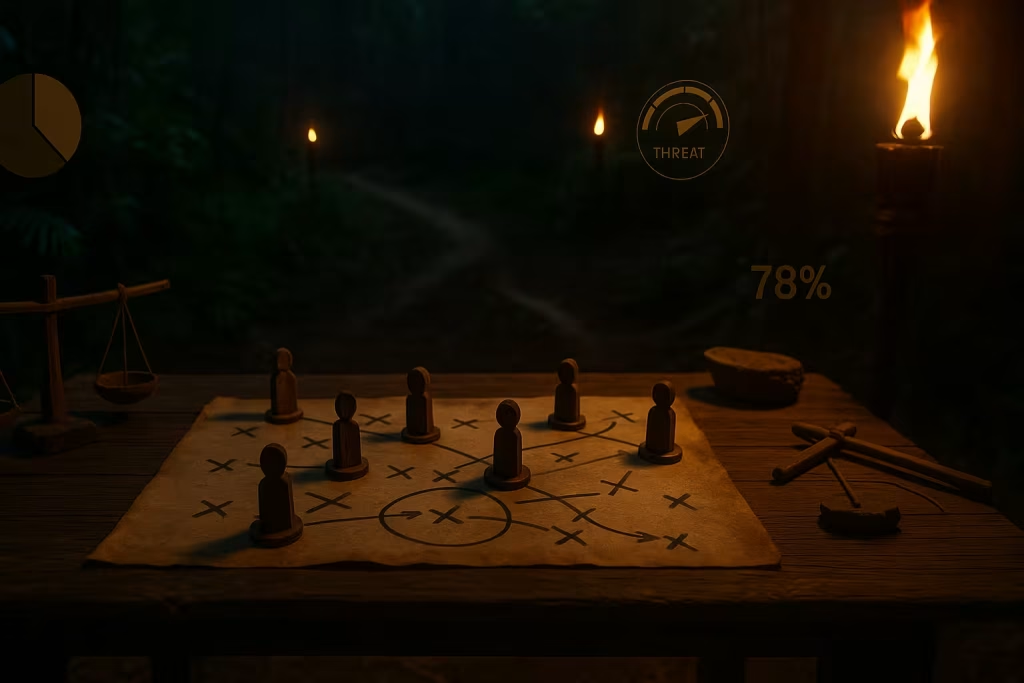
Betting on reality TV shows can be very challenging. Survivor 50 is going to reward a very specific type of player — and it’s not always the one fans think. With 24 returning contestants, multiple former finalists, and a few outright legends, the path to the end is more complex than ever. If you’re trying to predict the winner (or make a smart betting pick), these are the exact factors that will make or break a player’s chances.
1. Threat Level Management (The #1 Predictor of Success)
In a normal season, only a handful of people show up with huge targets on their backs. In Season 50? Half the cast enters with glowing neon signs that say “VOTE ME OUT.”
Players like Ozzy, Cirie, Dee, and Devens will be watched from the second they step onto the beach.
That means the winner will almost certainly be someone who can:
- avoid looking like a mastermind
- avoid being a physical standout early
- avoid narrating every strategy move
- avoid being “the face” of an alliance
The best winners in big returning seasons are the ones who fade into the background just long enough to strike when the timing is perfect.
2. Social Bonding and Trust (The Real Currency of Season 50)
With so many experienced players, no one will be fooled by big speeches or forced alliances. Returnees look for:
- stability
- loyalty
- believability
- and emotional intelligence
A player who can connect naturally across age groups, personalities, and eras will rise fast in this cast.
Social glue is what wins returning-player seasons — not flashy moves.
This is why players like Chrissy, Aubry, Kyle, and Charlie start with huge upside. They’re not threatening, but they’re instantly trustworthy.
3. Strategic Flexibility (Not Overplaying, Not Underplaying)
Season 50 is going to punish extremes:
- If you overplay, you’ll get targeted instantly.
- If you underplay, you’ll get dragged or cut when alliances shift.
The ideal winner will be someone who:
- adapts quickly
- understands when NOT to push a move
- plays the middle early
- ramps up only after merge
- avoids being the “strategic face” of the season
Players who make quiet moves that look loud in hindsight are the ones who win these seasons.
4. Challenge Capability (Enough to Survive, Not Enough to Threaten)
This is where Survivor 50 becomes tricky.
You must win immunities in the endgame. There is no modern Survivor winner who can’t win when it counts. But if you’re too dominant early, you’re gone by Episode 5.
The sweet spot is a player who:
- isn’t the tribe’s challenge liability
- isn’t the reason a tribe wins every immunity
- looks capable without looking unstoppable
- can close out late-game challenges under pressure
Players like Chrissy, Genevieve, and Charlie hit this balance perfectly.
5. Jury Appeal (A Winner’s Resume Must Be Believable)
This is an all-returnee season. Juries will be:
- savvy
- strategic
- bitter if blindsided poorly
- and highly judgmental of low-effort gameplay
The winner MUST have:
- clear moves they can take credit for
- votes they helped steer
- a consistent social presence
- a story that resonates
And most importantly…
The jury must like them.
Survivor juries rarely reward “look how smart I am” finales. They reward emotional connection + strategic ownership.
6. Season 50 Twist Dynamics (The Wildcard)
With fan-voted game elements, the season could tilt in favor of:
- social players
- challenge players
- strategic chameleons
- players with high popularity
- or players who thrive in transparency-heavy gameplay
We don’t know the exact mechanic breakdown yet, but one thing is certain:
Season 50 will not favor players who rely on:
- idols
- complicated vote splits
- or deep manipulation
Expect a cleaner, more classic style of Survivor — and that’s a major advantage for balanced, level-headed players.
7. The Merge Chaos Factor (Where Most Predictions Go Wrong)
The merge is where Survivor 50 will explode.
Here’s what we expect:
- Big threats will get targeted instantly.
- Medium threats will get squeezed in the crossfire.
- Quiet players with strong relationships will rise.
The merge boot is ALWAYS a red flag. Whoever survives that vote gains enormous win equity.
When you put all of these pieces together, the winner isn’t the strongest. It isn’t the smartest. It isn’t the most beloved.
It’s the one who balances ALL of these factors without drawing heat.
Threat Analysis: Who Looks Dangerous… But Won’t Win Survivor 50
On paper, Survivor 50 is packed with some of the most dangerous players the game has ever seen. Fan favorites. Challenge legends. Sharp strategists. Even a few former champions. These players look like they should be frontrunners — and they will dominate early conversations online.
But here’s the truth:
In returning-player seasons, the biggest threats almost never win.
Everyone knows their résumés. Everyone knows their reputations. And everyone walks in ready to vote them out before they become unstoppable. That’s exactly why these popular picks won’t be the ones holding the million dollars at the end.
Let’s break down the two danger zones: (1) the fan-favorite legends, and (2) the strong-but-visible contenders.
The Fan-Favorite Legends (Huge Names, Huge Targets)
These are the players viewers love… and the players their castmates cannot afford to let survive.
Ozzy Lusth (+2500)
A physical icon who dominates challenges — which is exactly the problem. Nobody wants to face Ozzy in individual immunity. He’s an auto-target the second tribes lose.
Cirie Fields (+3000)
One of the greatest players in Survivor history. That’s precisely why she goes early. No one wants to sit next to Cirie at the end, and everyone knows it.
Rick Devens (+850)
A walking highlight reel. Fun for TV, terrifying for opponents. Devens’ idol-hunting, chaos-filled style means players will remove him before he heats up.
Dee Valladares (+1400)
A recent winner who dominated her season. Great player, bad timing. Winners rarely survive the crosshairs in all-returnee formats.
Bottom Line: These legends will define early episodes… just not the endgame.
The Strong-but-Visible Contenders (Dangerous… But Too Noticeable)
These players have realistic winner profiles — but they’re a little too shiny. And shiny players get cut.
Aubry Bracco (+700)
A brilliant strategist with deep-run consistency. But she’s well-known as a mastermind, and that reputation puts her in mid-game blindside danger.
Charlie Davis (+600)
One of the best new-era players. Strong socially and analytically. But his calm strategic style makes him a prime “we can’t let him reach final five” candidate.
Genevieve Mushaluk (+1100)
Balanced and trustworthy, but with enough physical presence to be seen as a threat once the numbers shrink.
Dee Valladares & Kyle Fraser (Champions Tier)
Both are incredibly capable… but both enter with glowing “recent winner” targets on their backs.
Bottom Line: These players have the skill sets to win — but in a season filled with veterans, skill alone isn’t enough. You need invisibility early, influence late, and perfect timing.
So Who Can Win Survivor 50?
The winner of Survivor 50 won’t be the loudest player. It won’t be the most beloved player. It won’t even be the strongest player.
It will be someone who can blend in when it matters most…
…then strike at the exact right moment.
That profile belongs to only a handful of people in this cast — and one of them rises above all the rest.
(Which is exactly who we reveal next.)
The Mystery Pick — Our Projected Winner of Survivor Season 50

After sorting through the cast, the dynamics, the threat levels, and the projected odds… one name rises above the chaos. And what makes this name so compelling isn’t a flashy résumé, a dominating challenge record, or a TV-ready personality.
It’s the exact opposite.
The winner of Survivor 50 will be someone who can blend in early, quietly build trust in every direction, and then take control late without ever becoming the obvious person to beat. It will be someone strategic enough to control votes, calm enough to avoid panic, and likable enough to beat anyone at Final Tribal.
And that brings us to our mystery pick — the player who checks every single box.
🎉 Our Official Prediction: Chrissy Hofbeck Wins Survivor 50
Chrissy isn’t just our favorite pick — she’s the right pick for this specific season. When you look at the returning cast, the format, and the game trends of the modern era, Chrissy fits the winning formula better than anyone else out there.
Here’s why she stands apart:
1. She Manages Threat Level Better Than Anyone
Chrissy is respected but not feared.
Smart but not flashy.
Strategic but not sneaky.
This is the exact “winning temperature” you want in an all-returnee season. She’s never going to be the first name mentioned as a threat… but she’ll always be an asset to whatever alliance she joins.
2. She Builds Trust Instantly
Players love working with Chrissy:
- she listens
- she collaborates
- she doesn’t oversell moves
- she doesn’t create chaos
Her natural ability to bond across age groups and personality types makes her the ideal social centerpiece — someone everyone wants to keep around, not cut.
3. She Has the Logic and Composure to Navigate Big Twists
Season 50’s fan-driven twists will reward players who can stay calm and adapt on the fly. Chrissy thrives in exactly that environment.
She’s analytical without being robotic.
Strategic without being theatrical.
Decisive without being domineering.
In a season with big personalities and big egos, Chrissy is the quiet stabilizer who outlasts them all.
4. She’s Just Strong Enough Physically to Win When It Matters
Chrissy isn’t a challenge beast — which helps her early.
But she is capable of winning late immunities when she needs to.
This balance is much more dangerous than being a pure physical threat.
History shows that the winner of returning seasons usually wins at least one clutch immunity. Chrissy has that gear.
5. Her Story Resonates With Juries
Juries love narratives that feel earned:
- someone underestimated early
- someone who played a smart, steady game
- someone who owned their moves without overhyping them
- someone who treated people with respect
Chrissy fits this mold perfectly. Her finale performance in Survivor 35 was strong enough that many fans still argue she should have won. Season 50 is her perfect redemption arc.
6. She Fits the “Classic Survivor” Profile — Which Matters More in Season 50
With fans influencing the season, there’s a strong chance Survivor 50 leans away from edge-heavy twists and toward a cleaner, more traditional format.
If the game shifts toward:
- relationships
- loyalty
- communication
- clarity
- vote direction
…then modern-era chaos players lose power, and calm, structured players like Chrissy gain a massive advantage.
Final Verdict
Chrissy has the rare combination of:
- social charm
- low early threat
- strategic intelligence
- late-game potential
- jury-friendly résumé
- and perfect narrative positioning
She doesn’t just have a chance to win.
She has the most logical and most profitable path to victory in the entire cast.
And that’s why Chrissy Hofbeck is our official GamblingSite.com prediction to become the Sole Survivor of Season 50.
Value Sleeper Pick — The Best Long-Shot Bet
If you’re looking beyond the favorites and want a player with real upside at a generous price, one name stands out above the rest:
⭐ Genevieve Mushaluk (+1800)
Genevieve isn’t the flashiest player in the cast — and that’s exactly why she’s such a strong sleeper. She has the perfect blend of quiet social awareness, steady physical ability, and under-the-radar charm that tends to thrive in big returning-player seasons. She’s strong enough to win challenges when needed but not so dominant that she becomes an early target.
What makes her such a valuable long-shot bet is her win path clarity. If Genevieve lands on a tribe without too many high-profile threats, she can easily slip into a middle position, avoid the blast radius of early blindsides, and gradually build a résumé that juries respect. In a season full of big personalities, a calm, consistent player like Genevieve can quietly rise while others self-destruct.
Bottom line: At +1800, she offers one of the best risk-to-reward profiles in the entire cast.
Betting Strategy Recommendations

Survivor winner betting is all about timing, value, and understanding how the game unfolds across key phases. Unlike sports where stats tell most of the story, Survivor is driven by social momentum, edit patterns, and unpredictable twists — which means your betting strategy needs to stay flexible.
To help you manage risk while maximizing upside, here’s the simple framework we recommend for Survivor 50:
1. Use a Split-Stake Strategy
Instead of putting your full bet on one player, divide your position:
Suggested Split:
- 70% on a safe, low-threat contender
- 30% on a high-upside sleeper
This keeps you covered against early chaos while giving you a shot at a big payout.
2. Watch the Pre-Merge, But Don’t Overreact
Early boots are often random or tribe-chemistry related. Your winner rarely shows their hand until Episode 3–5. Let the early fog of war settle before making mid-season adjustments.
3. Track Edit Momentum
If a player gets:
- consistent confessionals
- clear strategic reasoning
- positive framing
…their win equity rises sharply. Survivor editors love shaping “winner stories,” especially in milestone seasons.
4. Hedge Mid-Season
Once merge hits and alliances are clear, adding a small hedge on another safe contender protects you from sudden blindsides or twist-induced exits.
5. Fade the Challenge Beasts
Unless they survive deep into the merge, avoid betting heavily on physical threats. The bigger the season, the sooner they’re targeted.
Final Verdict: The Smartest Survivor 50 Bets on the Board
Survivor 50 is shaping up to be a once-in-a-generation season — the kind that rewrites the meta, reshuffles power dynamics, and turns early predictions into chaos by the end of Episode 1. With 24 returning players, multiple finalists, recent winners, and fan-driven twists, this season won’t reward the loudest strategist or the most athletic competitor. It will reward the player who understands timing, threat management, and connection better than anyone else out there.
That’s exactly why our projections point to a very specific type of winner this season: someone steady, trustworthy, and strategically sharp without ever painting a target on their back. Two players rise above the rest in our model:
GamblingSite.com Survivor 50 Picks
- 🏆 Projected Winner: Chrissy Hofbeck (+450)
Calm, logical, socially strong, and perfectly positioned to glide through early chaos and control the endgame. - ⭐ Best Value Sleeper: Genevieve Mushaluk (+1800)
Under-the-radar, likable, physically capable, and built for a deep run if stronger personalities self-destruct.
These two profiles give you both safety and upside — the combination that historically performs best in all-returnee seasons.
As new previews, cast interviews, and early-season signals roll in, we’ll keep updating our projections. But based on everything we know now, Chrissy is the smartest bet on the board… and Genevieve is the long-shot you don’t want to ignore.
As hype builds for Survivor 50, be sure to keep checking reliable betting sites for updated odds, shifting lines, and new value opportunities.
Hawaii vs. UNLV Football Prediction & Top Bets (November 21, 2025)
Hawaii is so close to the Mountain West title they can taste it. Despite trouncing first place San Diego State in their last game, however, they will enter a road date with the UNLV Rebels as +120 underdogs.
This game comes with all the trimmings, as both Hawaii and UNLV are 4-2 in the MW conference, both teams have stout records, and both are still eligible for a bowl game.
On top of that, this game has an obscene 64.5 total, with these teams operating at an elite level offensively. We can safely expect a high-powered affair on Friday night, and the 2.5-point spread indicates we won’t want to go to bed early and miss the end of this one, either.
Betting on Hawaii vs. UNLV correctly isn’t the same as kicking back and enjoying a likely barn burner, of course. If you need some help formulating your top picks, join me as I go over the odds and key matchups en route to a Hawaii vs. UNLV prediction.
Game Basics & Context
- Matchup: Hawaii Rainbow Warriors (7-3) vs. UNLV Rebels (8-2)
- Date & Time: Friday, November 21st, with kickoff at 9:30 pm CT (10:30 pm ET)
- Venue: Allegiant Stadium in Paradise, NV
- How to Watch: The game will be broadcast on YouTube TV
Betting Odds
Check out the latest Hawaii vs. UNLV odds, per DraftKings:
| Team | Spread | Moneyline | Total |
|---|---|---|---|
Hawaii | +2.5 (-102) | +120 | O 64.5 (-105) |
UNLV | -2.5 (-118) | -142 | U 64.5 (-115) |
Rivalry & Venue Context
This Mountain West rivalry isn’t the most storied in college football, but it has a solid 34 meetings already. Hawaii has the slight edge (19-15) overall, but UNLV has secured wins the last two times they faced off.
That could be history we may want to pay attention to, as the Rebels edged out Hawaii in a tight 29-27 contest last year, and blew them out (44-20) the year prior.
Friday’s game goes down at Allegiant Stadium, and UNLV has held serve at home in this series, going 4-1 over the last five meetings in Nevada.
Why This Game Matters
This is a huge game within the Mountain West conference, as both teams are one game out of first place with two games remaining on their schedules.
This is an especially huge game for the Rainbow Warriors, as they destroyed San Diego State last time out. If they win out and the Aztecs lose one more game, the conference title is theirs.
UNLV is still alive, though. They are looking at a similar reward if they can win their last two MW games. Conference title hopes aside, these teams are still in position for a bowl game, and finishing the season strong will help decide their fates.
Team Profiles
Hawaii Rainbow Warriors
The Rainbow Warriors beat Stanford 23-20 to get off to a 1-0 start early in the year, only to stumble in a brutal 40-6 loss to Arizona the next week. That was their low point, though, as they bounced back with two big wins and have gone 6-2 ever since.
Hawaii lost to Fresno State by two and fell to San Jose State in a 45-38 shootout, which goes to show just how competitive this team is. They have gotten this far by their offense (31st in scoring), and are equipped to go to war with the best offenses in the nation.

Here’s a quick look at what they do well:
- Finish the Job: Hawaii puts up 31.3 points per game, but it’s their sterling execution inside the 20 that makes them so good. They convert at a remarkable 96.97% clip in the red-zone, which is the 3rd best percentage in all of college football.
- Pass Happy: Few teams air it out (and do it well) like the Rainbow Warriors. Their 61.73% pass rate is the 5th highest in the country, but they turn volume into substance with their 39th ranked completion rate and over 308 passing yards per game (5th).
- QB Pressure: As effective as the Rainbow Warriors are on offense, they do have a feather to stick in their defensive cap, too. They come in with a blistering 7.89% sack rate, which is the 16th best in the nation.
UNLV Rebels
UNLV has a better record than their opponent this week, having started the season with a scorching hot 6-0 record. That hot run included three blowouts wins, but it was actually their ability to edge out Miami Ohio (41-38) and Air Force (51-48!) that displayed their potential.
Their offensive potential, at least. This team is a horror show on defense, and it turned into a problem when they got trounced by Boise State and lost a 40-35 thriller to New Mexico.

UNLV bounced back from that two-game skid to win their last two games, but there are certainly question marks about their play on the defensive side of the ball.
Here’s a quick look at where they’ve excelled this season:
- Splash Plays: UNLV checks a lot of boxes on offense as the nation’s 12th best scoring team, but their ability to spring big plays is what makes them dangerous. The Rebels rank inside the top-25 in yards per pass, yards per rush, and yards per play.
- Elite Balance: While they can explode and kill you from anywhere, they also can hurt you from either the ground or the air. They are a very balanced offense, and yet due to their big play ability they still rank 33rd in passing and 27th in rushing.
- Turnover Margin: On top of being balanced and explosive, UNLV takes care of the football with the best of them (43rd). They are also very good at forcing turnovers (37th) with 1.6 takeaways averaged per game.
Key Matchup Angles
Consider the following key matchups:
- Hawaii’s pass rush vs. UNLV’s passing game: The Rebels are tough to stop, but the Rainbow Warriors could have their kryptonite if De’Jon Benton (4.5 sacks) and the nation’s 16th best pass rush can get to them early.
- Jaden Bradley vs. Hawaii’s secondary: UNLV thrives on big plays and one of their best weapons is wide receiver Jaden Bradley (16.6 yards per catch). He could have a field day against a Hawaii pass defense that allows 7.7 yards per pass (95th).
- Micah Alejado vs. UNLV’s pass defense: I don’t know if anything else in this game matters if UNLV can’t slow down Alejado (2,2380 yards, 18 TDs). Hawaii passes a ton and UNLV comes in ranked 102nd in yards per pass and 101st in passing yards allowed per contest.
Betting Insights & Trends
Hawaii has been very good against the spread as a whole (7-2), while they are a stout 5-2 ATS as the underdog and 5-1 ATS in Mountain West games.
UNLV isn’t quite as good (5-5) against the spread, while they are just 4-4 ATS when favored and 1-4 against the spread at home.
These teams put up a lot of points, but the game total is understandably quite high. For what it’s worth, the Over is just 4-5 in Hawaii games in 2025, while it’s 5-5 for UNLV.
Best Bets & Confidence Levels
Check out my top Hawaii vs. UNLV picks:
| Bet | Recommendation | Confidence |
|---|---|---|
Hawaii ML (+120) | Winning on the road isn’t easy, but both teams have elite offense and only one has any semblance of a defense. UNLV specifically hasn’t displayed an ability to stop the pass – which is what Hawaii does best. | 7/10 |
Over 64.5 (-105) | This is a truly ridiculous game total, but I’d still hammer the Over. Both teams put up over 31 points per game, while the UNLV defense is abysmal. Add in what’s at stake here, and we should get quite the show on Friday night. | 7/10 |
Prop Play – Micah Alejado Over 3+ Passing TDs (-128) | You win if Alejado throws three touchdown passes. The matchup and game total should give you confidence, plus he’s literally done this in each of his last five games. | 7/10 |
- Primary Pick: Hawaii ML (+120)
- Secondary Pick: Over 64.5 (-105)
No disrespect to UNLV, but Hawaii showed what they can do when they smoked a good Aztecs team in their last game. I fully expect the Rainbow Warriors to come to play, while UNLV simply doesn’t have the pass defense to slow them down.
The only hope for the Rebels is sticking around, which plays into the Over bet. In addition, if Hawaii is going to win – and if the Over is going to deliver – it makes sense that Micah Alejado would stay hot and put three passing touchdowns on the board.
Risk Factors & What Could Go Wrong
Things don’t always go as planned when betting on sports. Here’s why my Hawaii vs. UNLV bets could fail:
- Home Field Edge: UNLV is at home and has fared well here in this particular series. It’s always possible they keep up with Hawaii and edge them out, just like they’ve done to other teams this year.
- Rivalry Game: On top of that, this is a rivalry game. Mountain West games have been pretty crazy this year, so predicting them can be a fool’s errand. Variance favors the bold – and the value with Hawaii – but rivalry games can go either way.
- Defensive Bite: The Over feels like a smash bet, but the Rainbow Warriors do have a capable defense. They just got done stifling San Diego State, after all. It’s always possible they hold UNLV in check and this game doesn’t get there.
Putting Our Pick on the Board: Here’s How It Plays Out
Final Score Prediction: Hawaii Rainbow Warriors 45, UNLV Rebels 41
My main Hawaii vs. UNLV prediction is that we are in for some serious fireworks. Both of these offenses are loaded and incredibly explosive. Hawaii is one-dimensional, but UNLV is not equipped to stop them and I don’t respect either defense enough to be worried about the total bet.
Hawaii offers really nice value despite being on the road. They have just enough defensive bite to make the necessary plays to pull off the upset, while their quarterback should be busy enough to get us a prop bet to convert, too.
